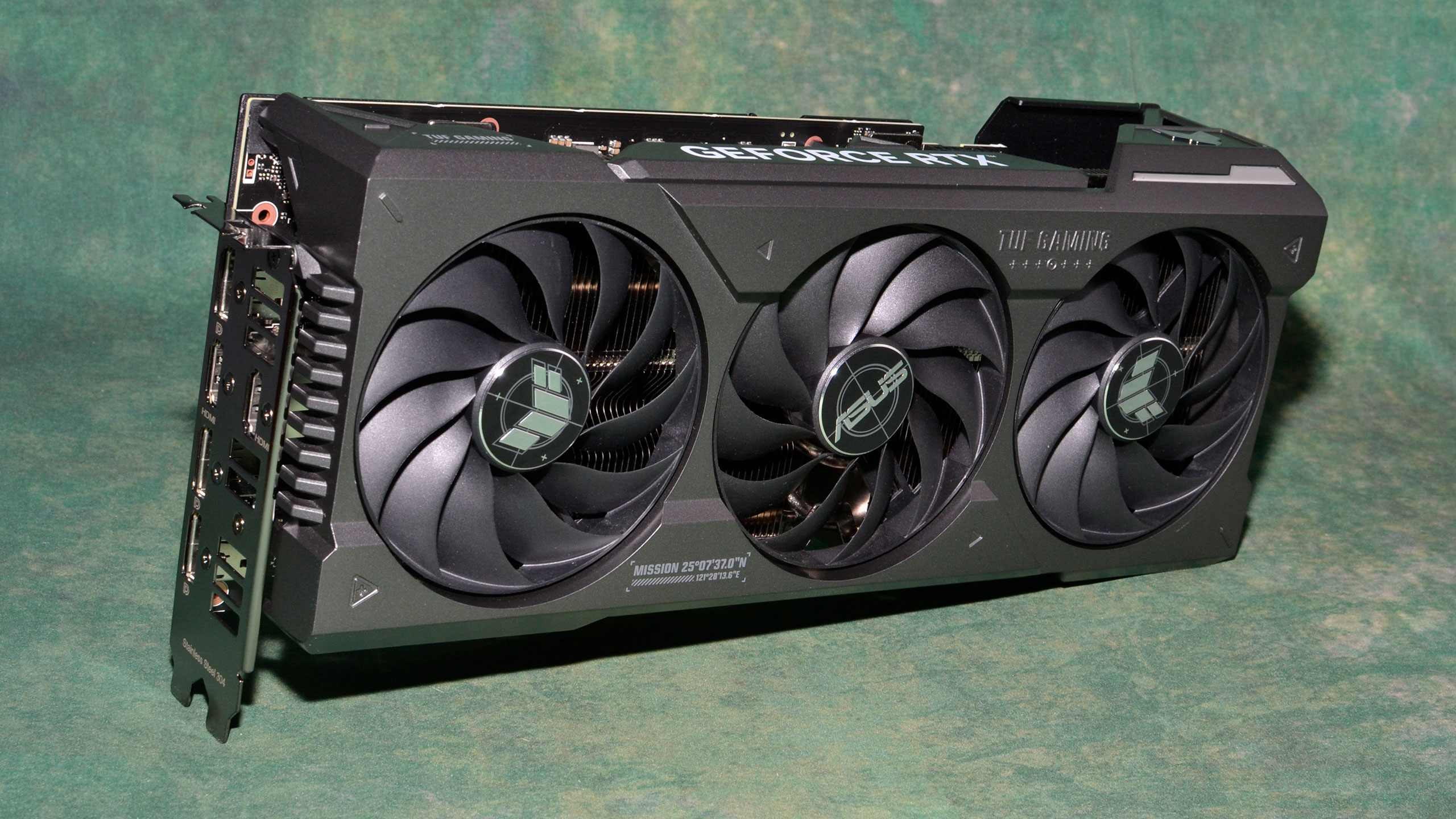Why you can trust Tom's Hardware
Wrapping things up, we have both 1080p medium and 1080p ultra testing results for the RTX 4070 Ti Super. We'd generally say that anyone buying an $800 graphics card isn't likely to be looking at 1080p performance, unless they're into professional esports maybe, but 1080p is also the render resolution for Performance mode 4K upscaling.
We're not going to analyze the 1080p results as much as the higher resolutions, both because we feel they're less critical for a GPU of this caliber, and because CPU limitations become more of a factor. Of course, future CPUs could potentially move the needle, but we don't typically see the massive generational improvements in CPU architectures that we get on the GPU side of things — a 10% improvement is quite good, and 20% is about as much as you can hope for.
RTX 4070 Ti Super 1080p Overall Performance
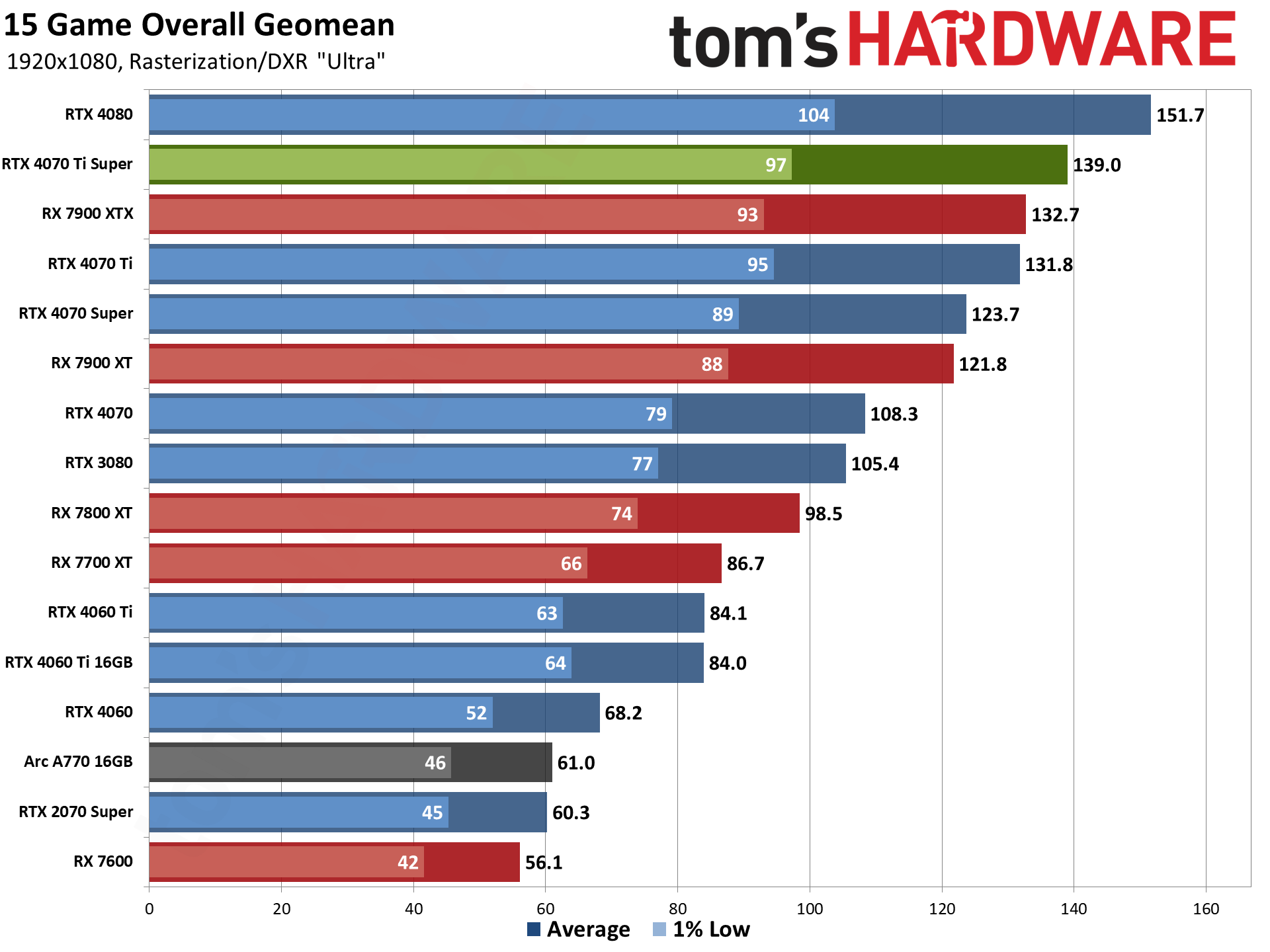
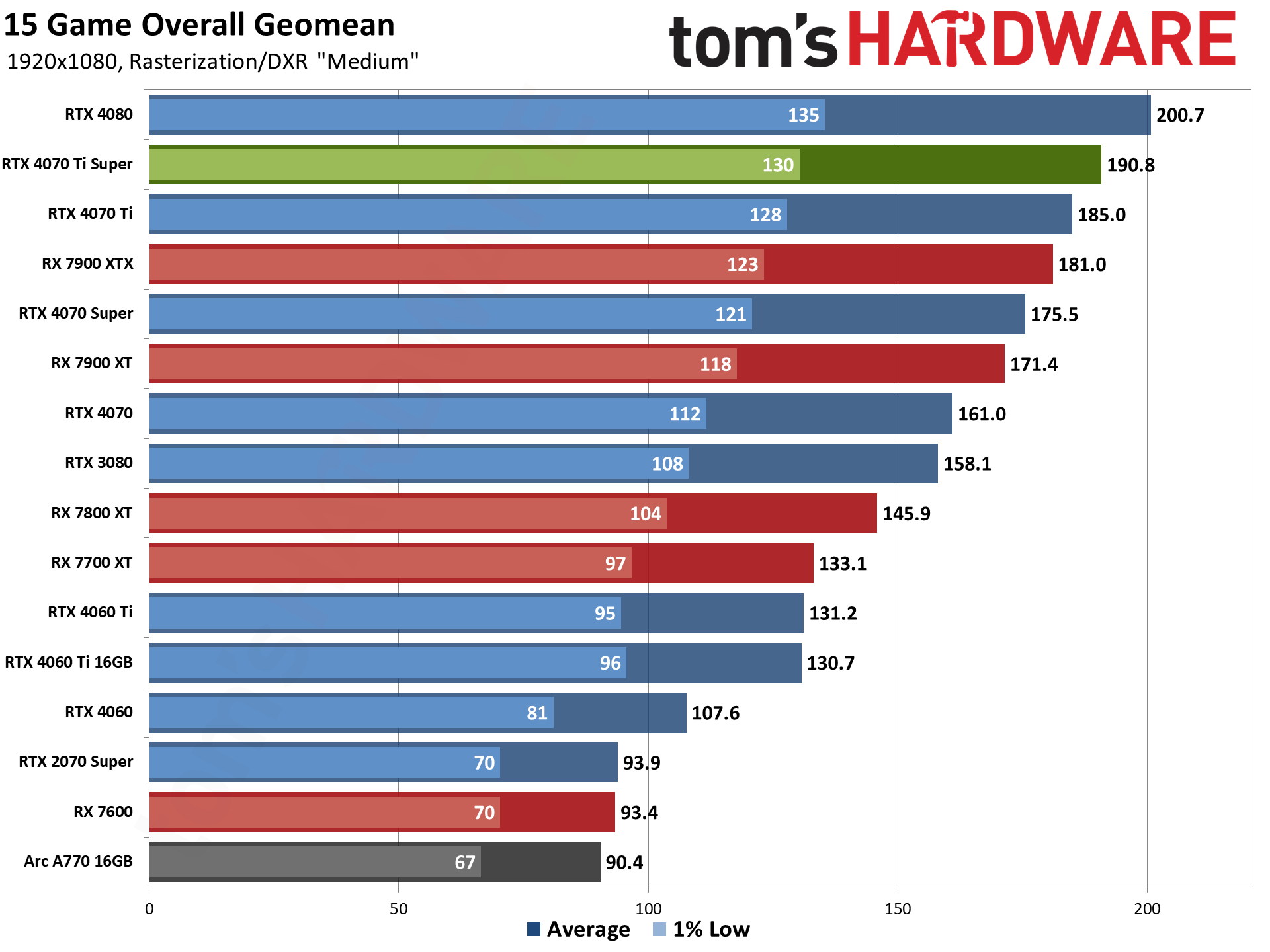
As you'd expect, the margins between most of the GPUs shrink at 1080p ultra compared 1440p ultra, and then shrink again when we look at 1080p medium. Overall, the 4070 Ti Super is only 6% faster than the vanilla 4070 Ti at ultra settings, and only 3% faster at medium settings. Similarly, it's 8% slower than the 4080 at ultra and 5% slower at medium.
That same shrinking of margins applies to AMD's GPUs as well. At 1080p the 4070 Ti Super now leads the 7900 XTX by 5%, for both ultra and medium settings, and it's 16% faster than the 7900 XT at ultra and 13% faster at medium.
If you have an older GPU and you only plan on gaming at 1080p, the diminishing returns aren't quite as bad. The new Super is still 34% faster than the RTX 3080 at 1080p ultra, though that shrinks to just 25% at medium settings. It's also 131% faster than the 2070 Super at ultra settings and still just over twice as fast at medium settings.
RTX 4070 Ti Super 1080p Rasterization Performance
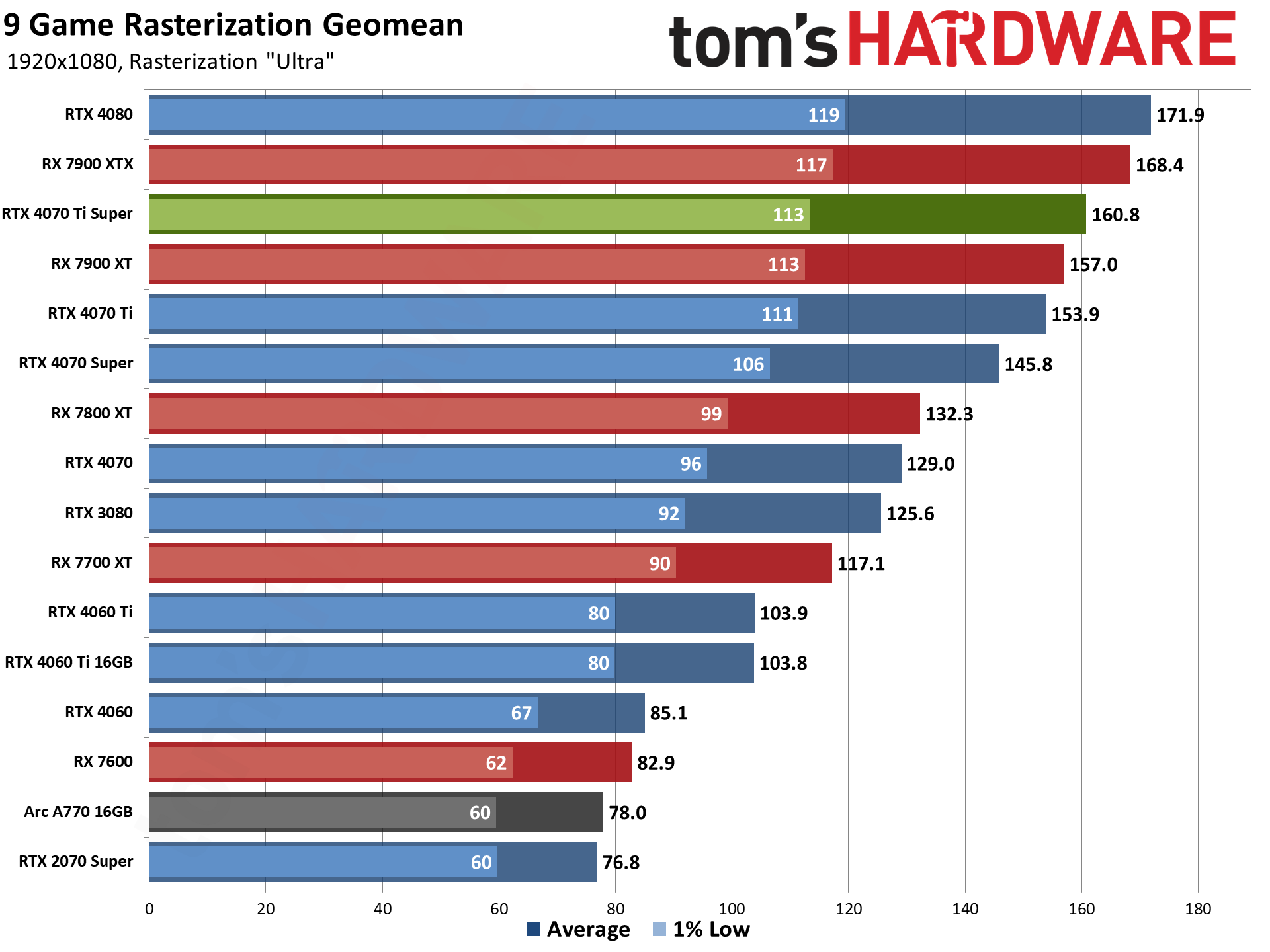
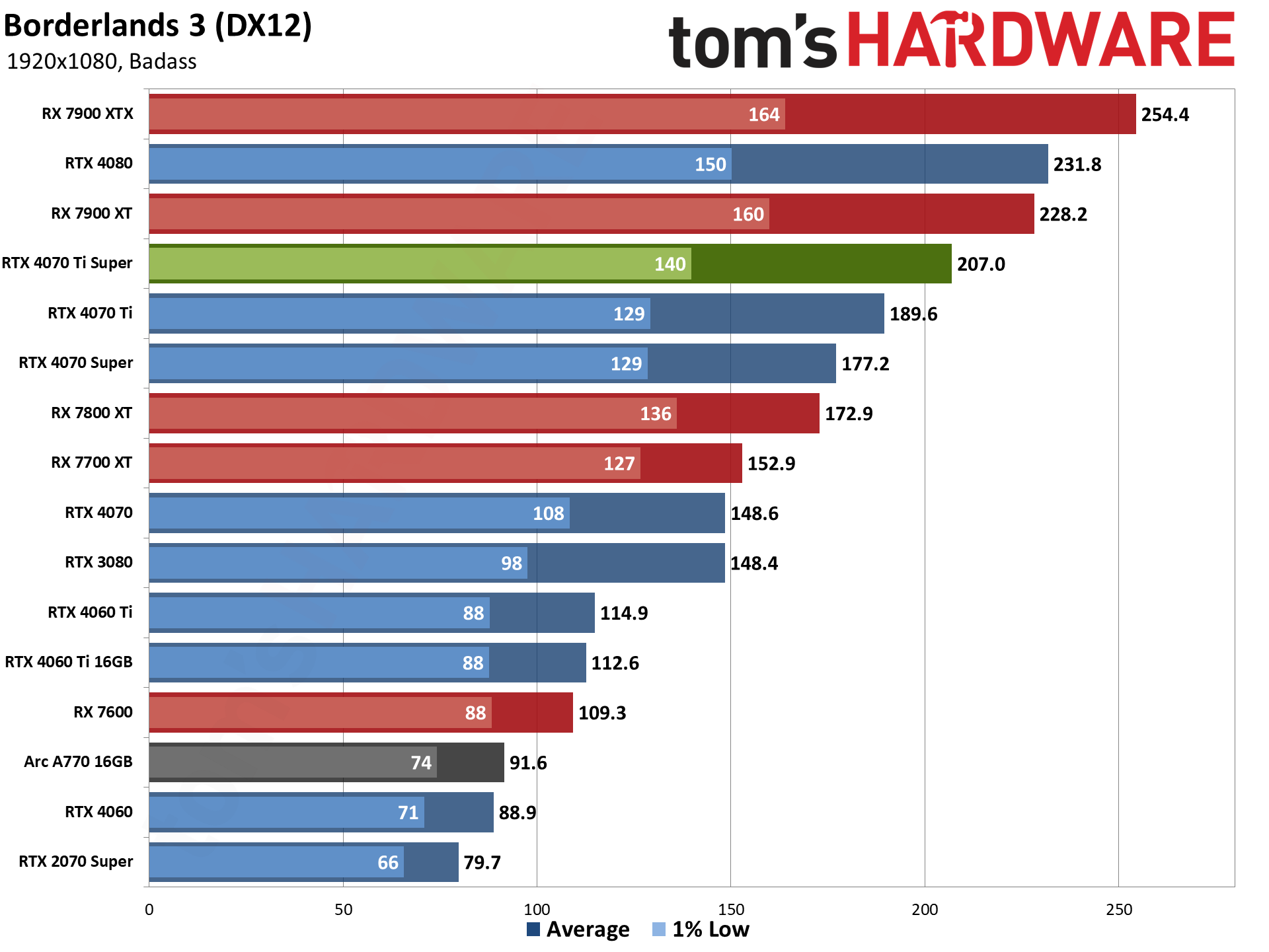
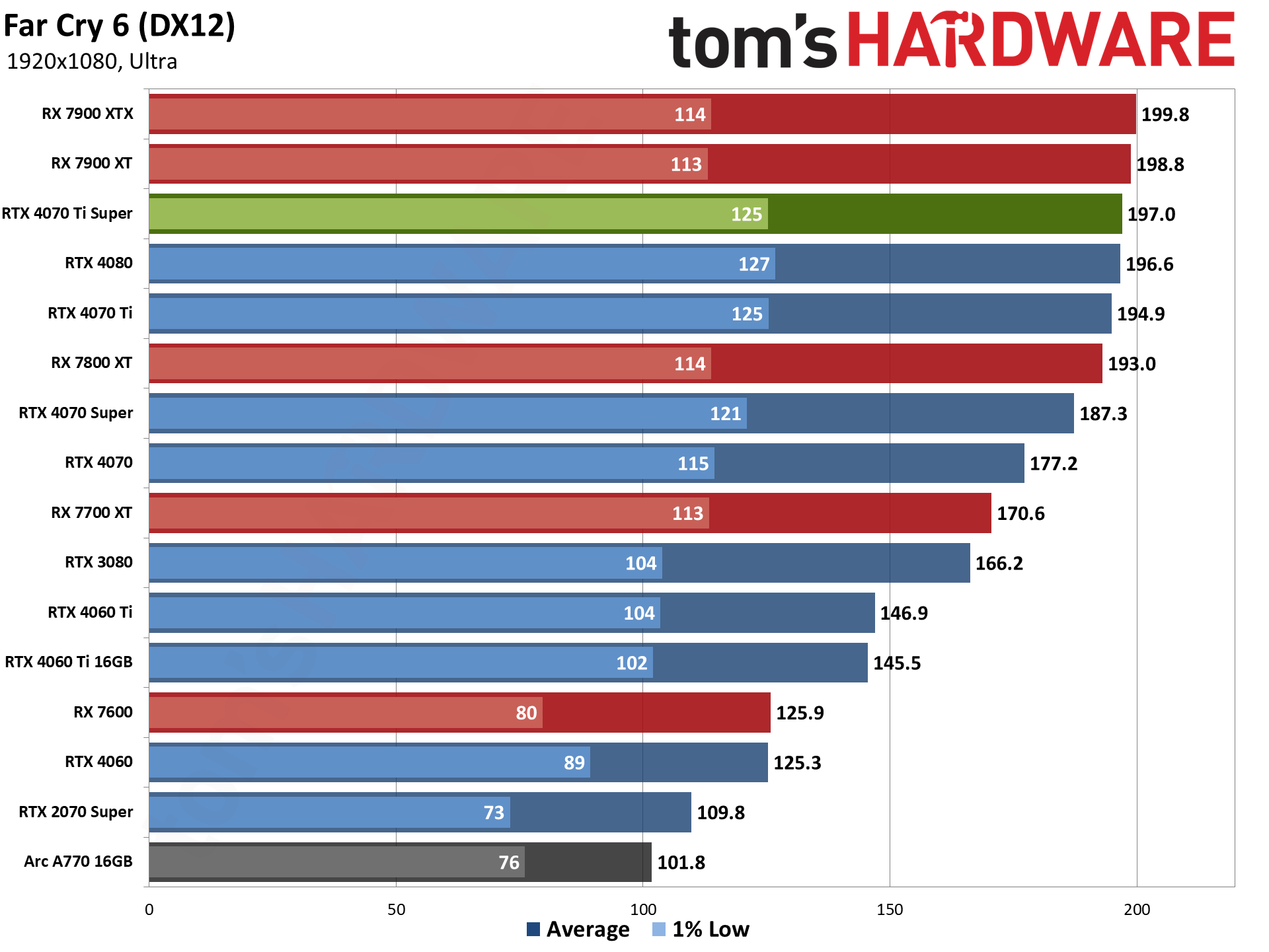
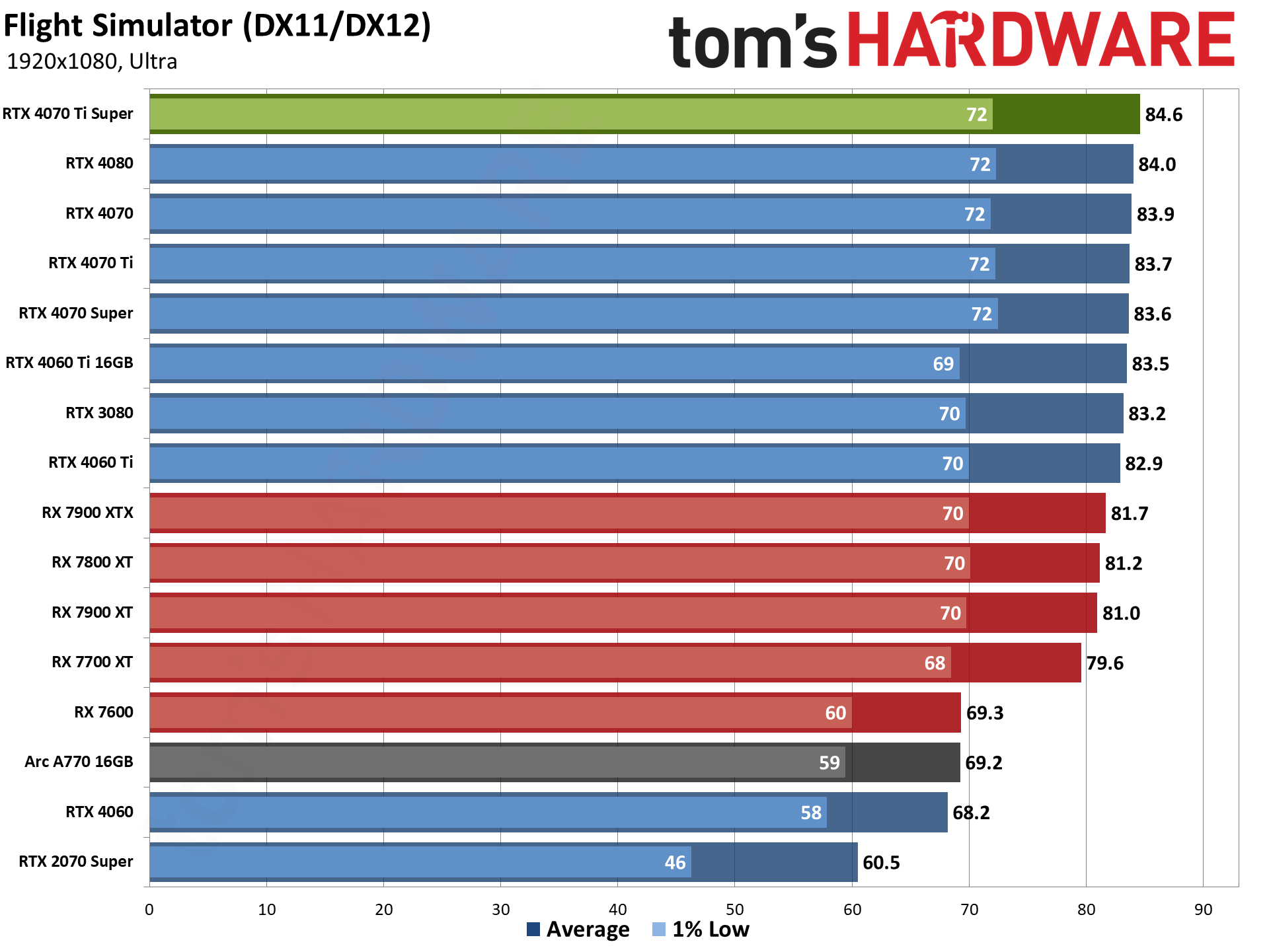
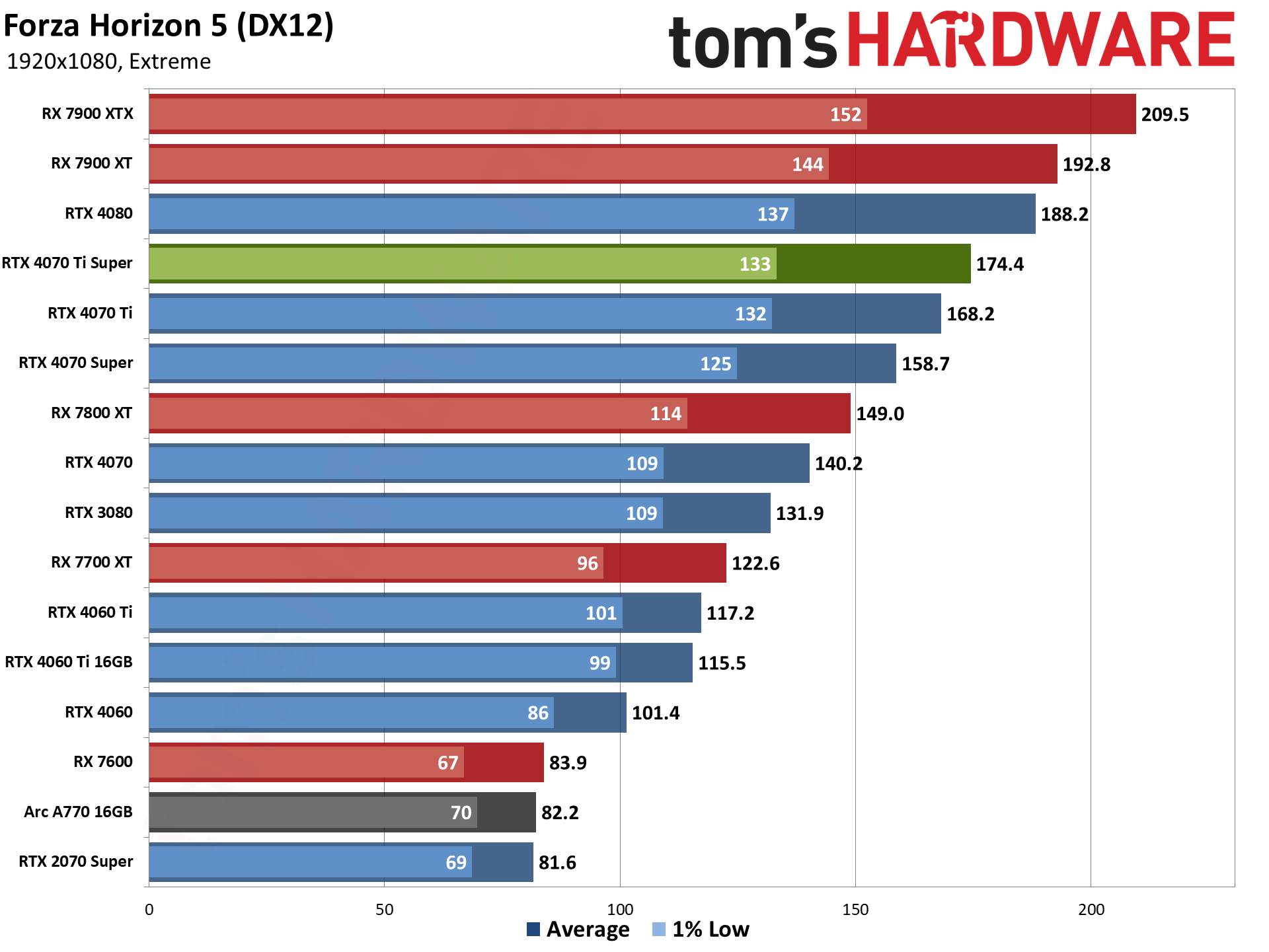
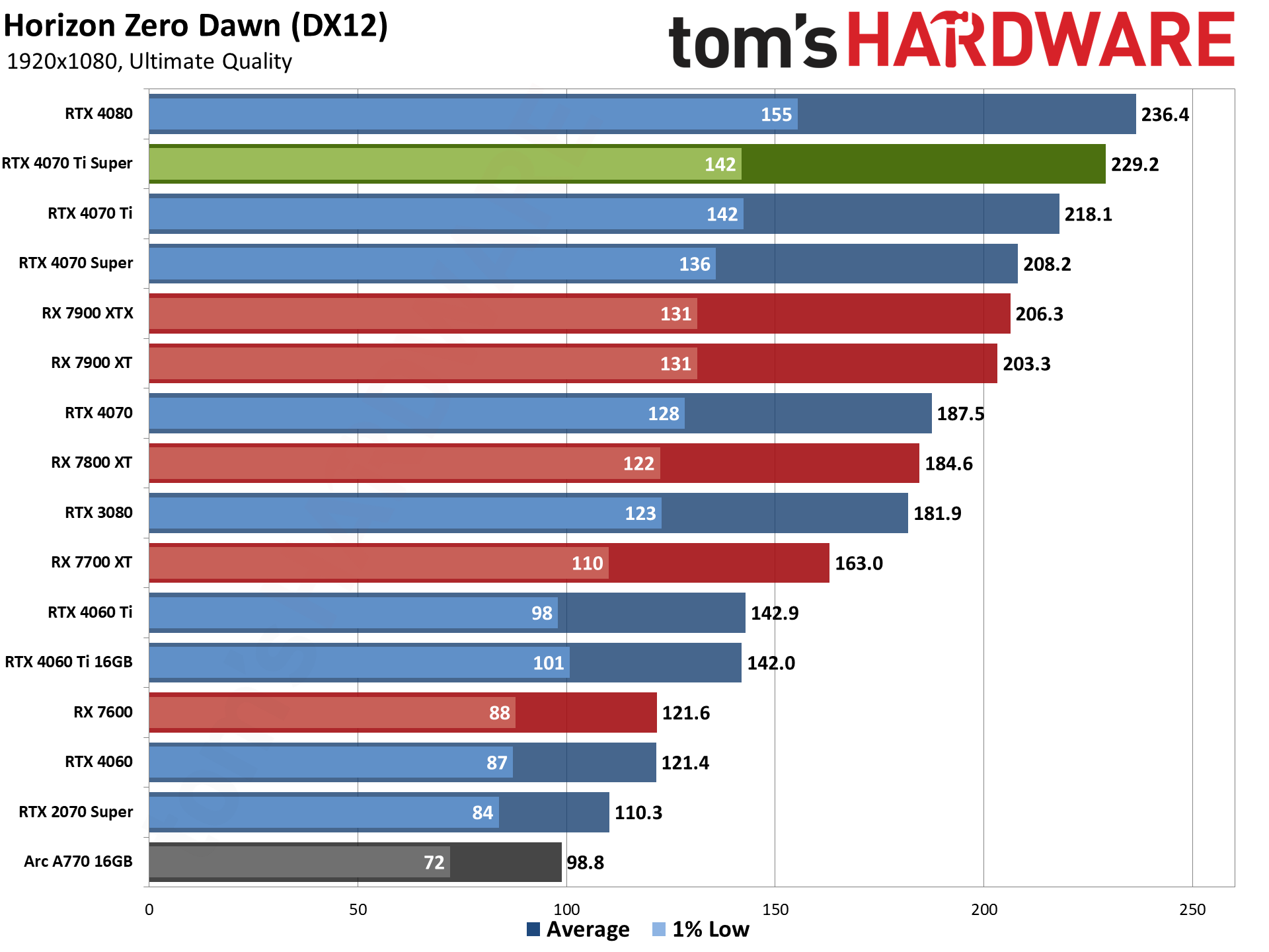
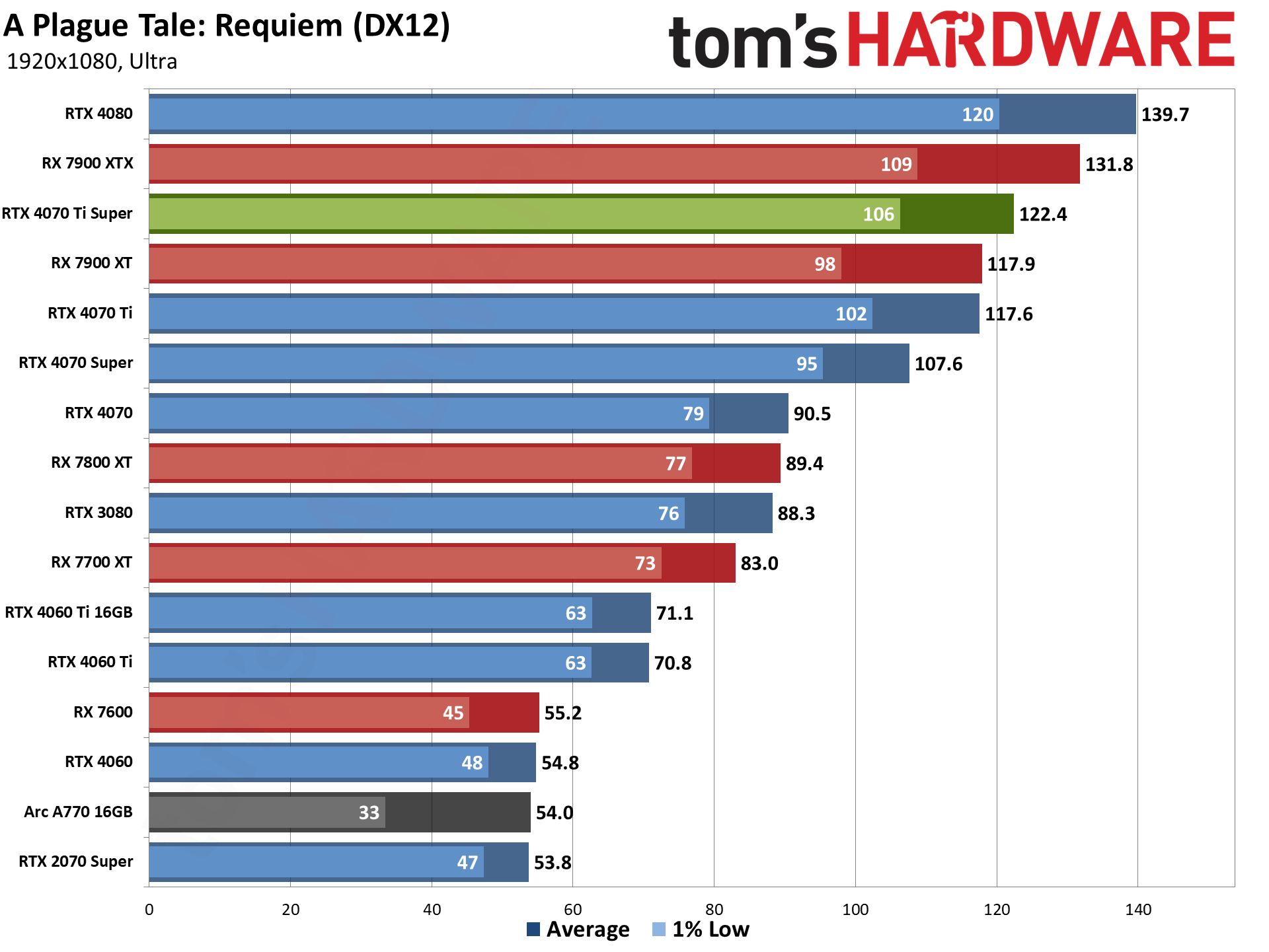
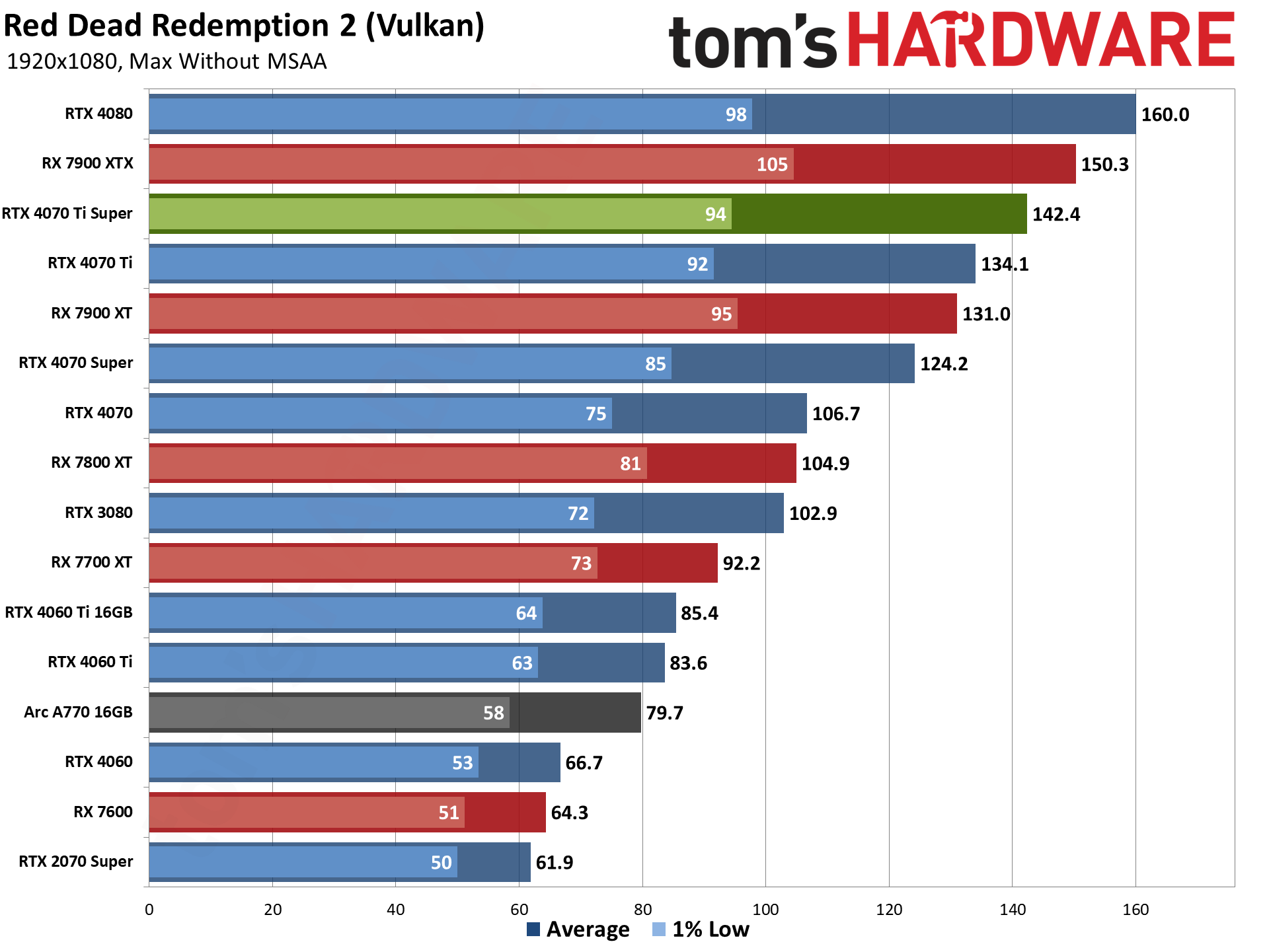
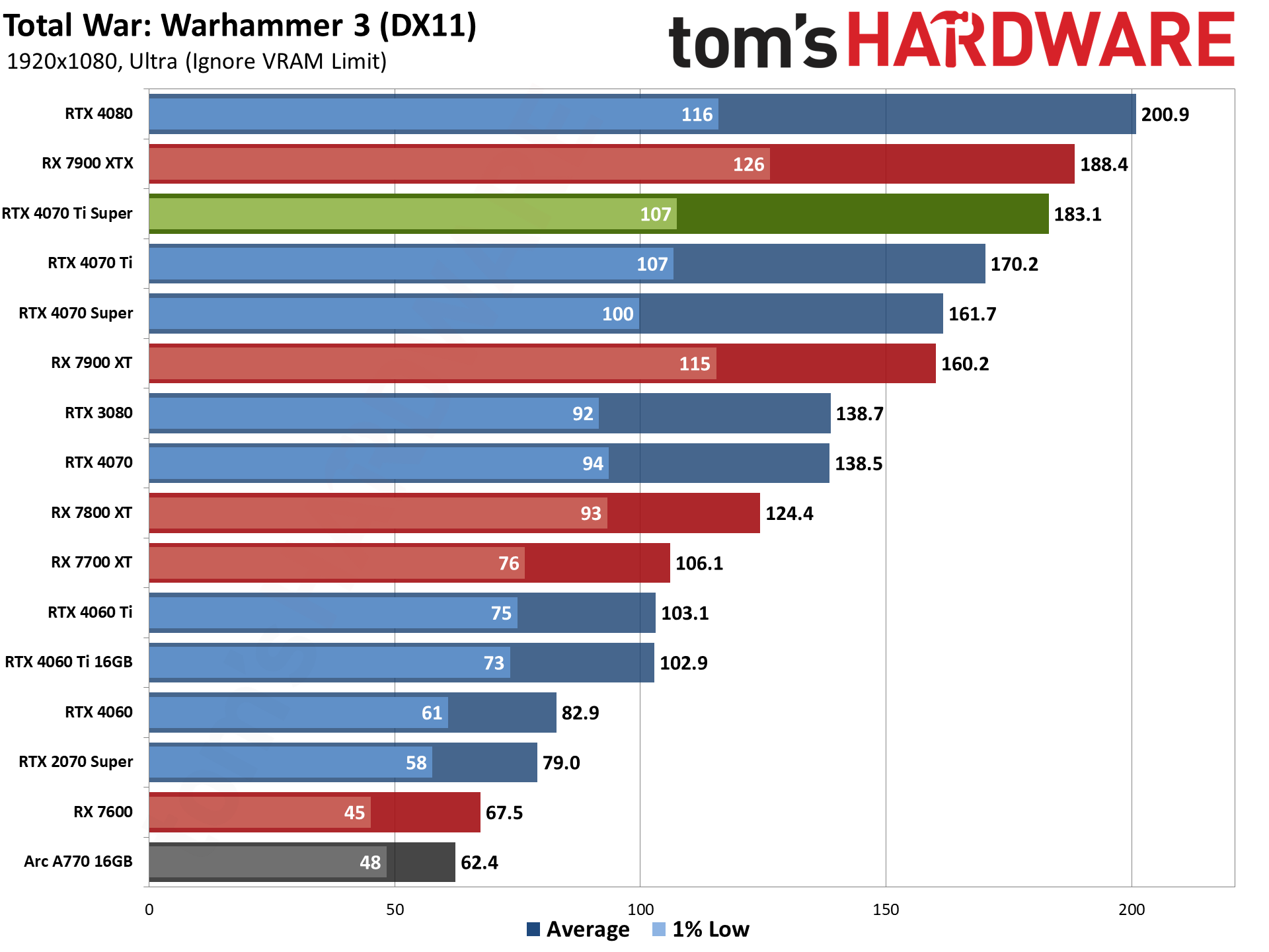
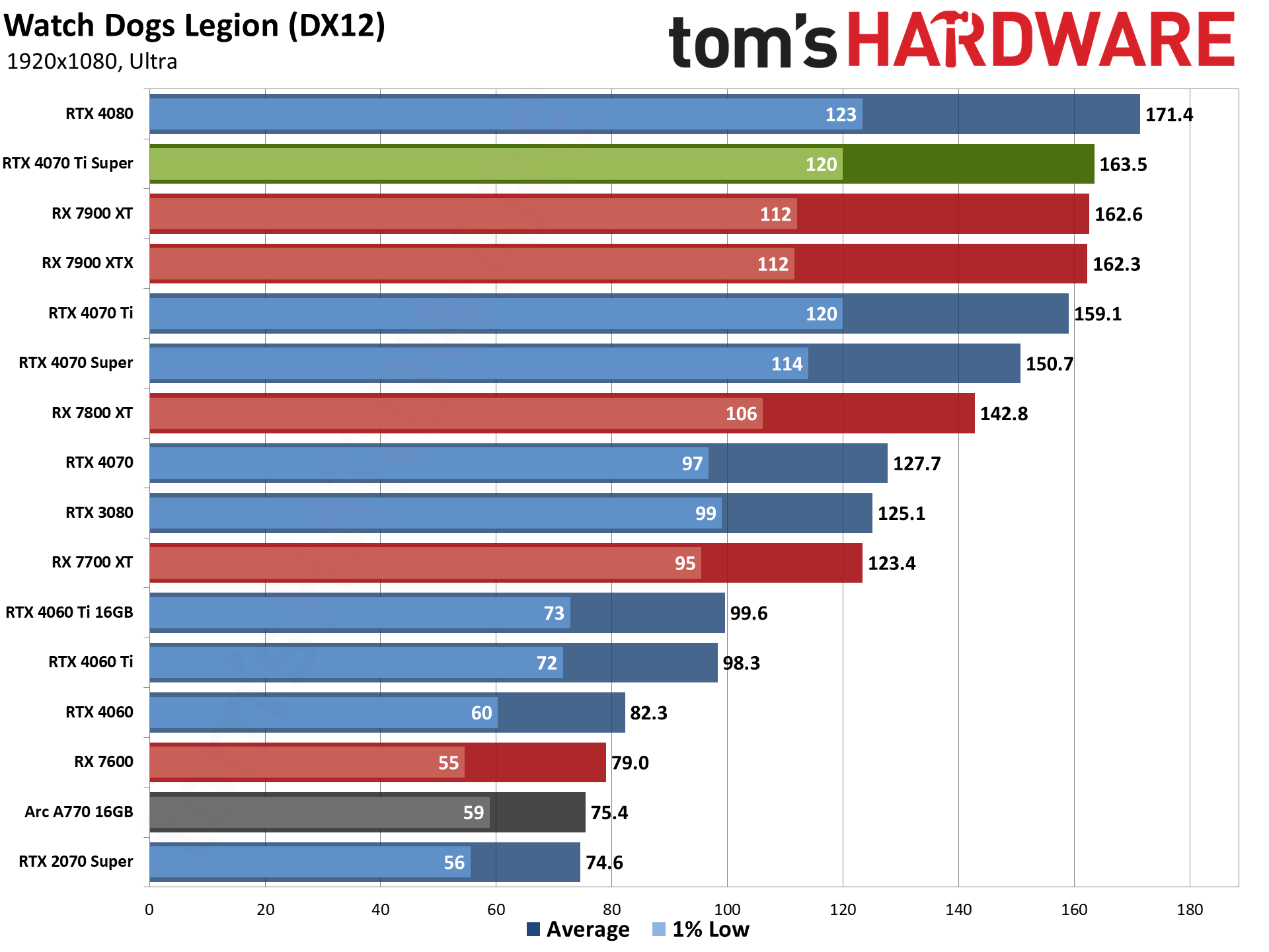
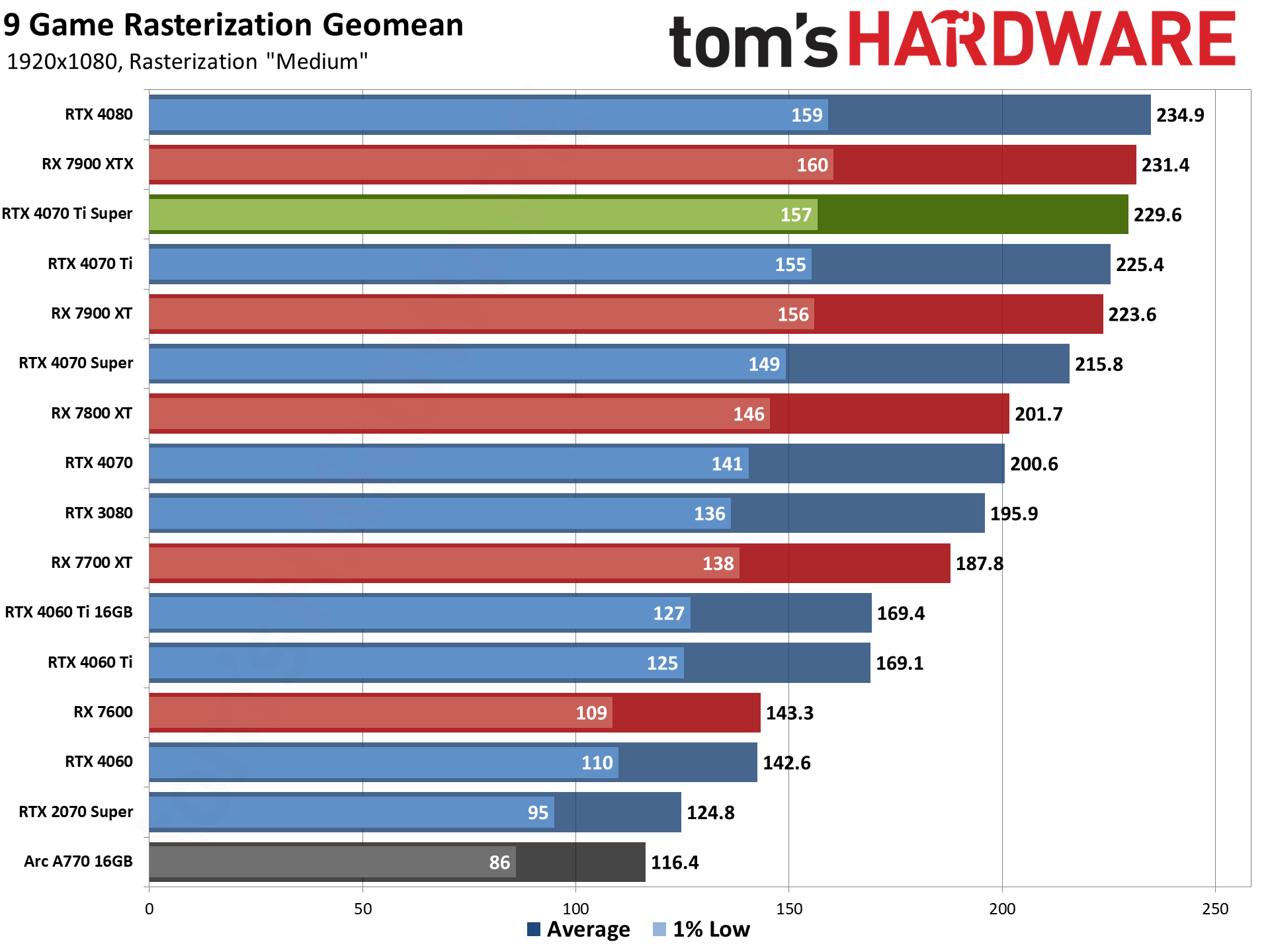
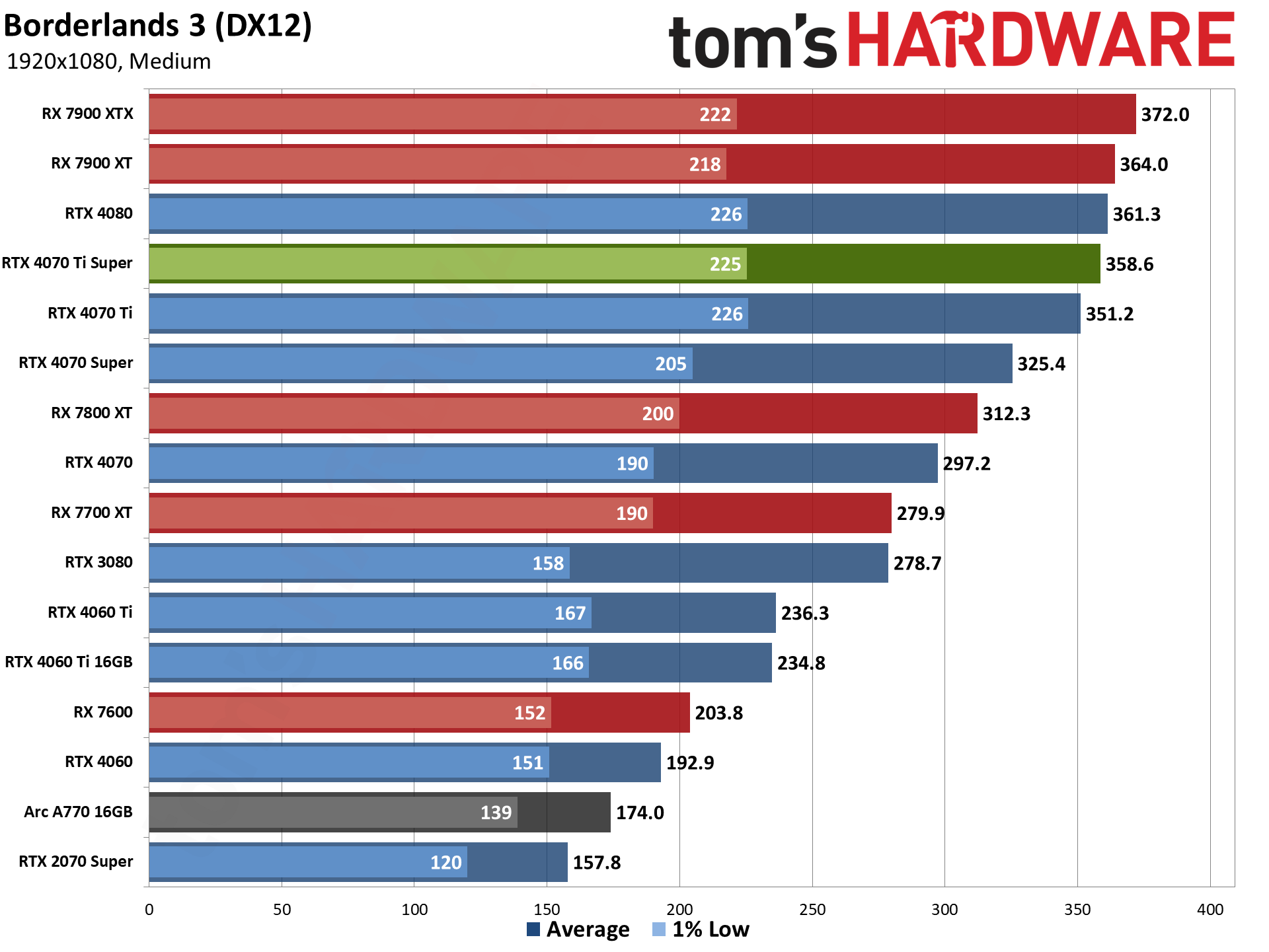
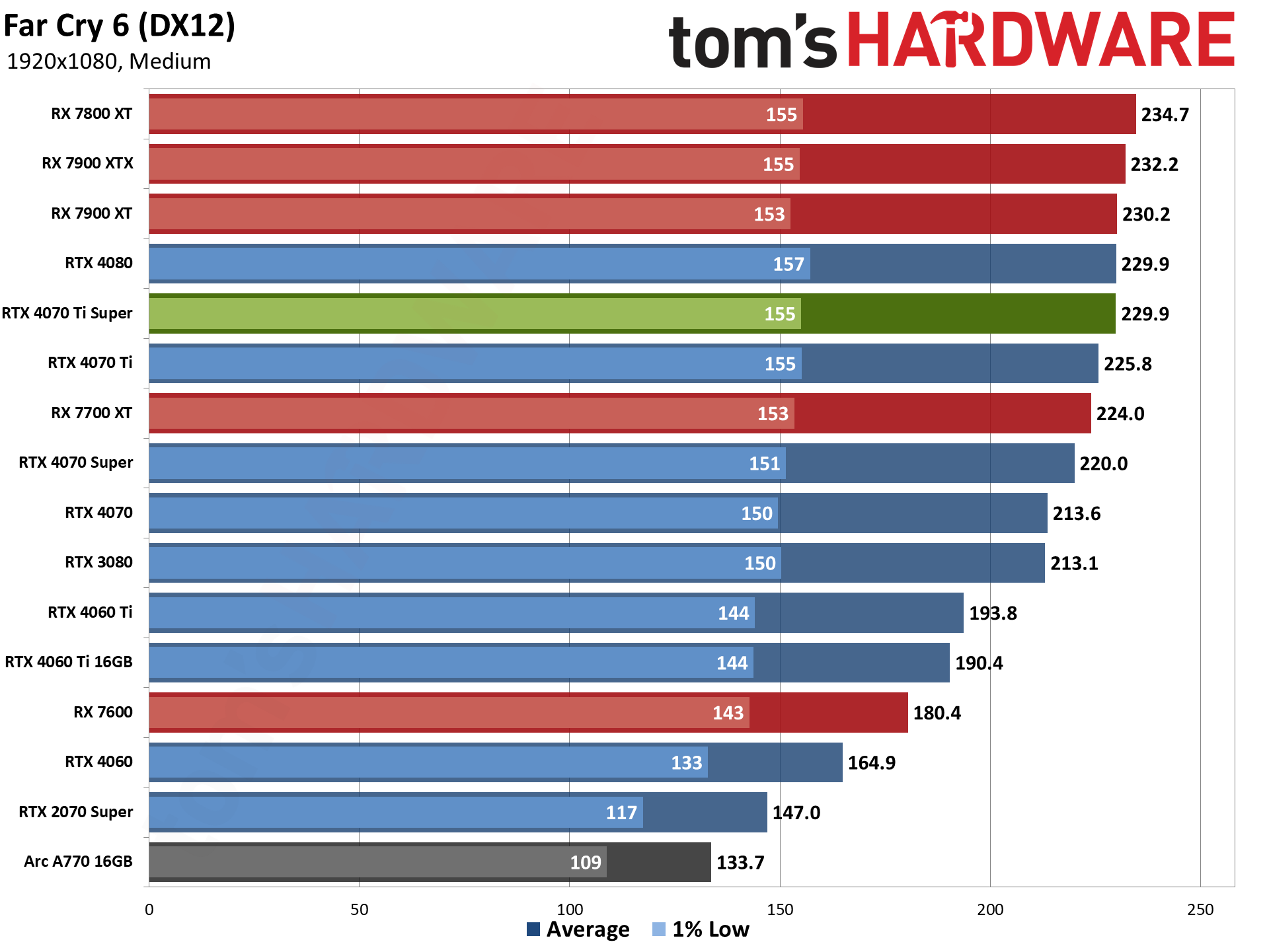
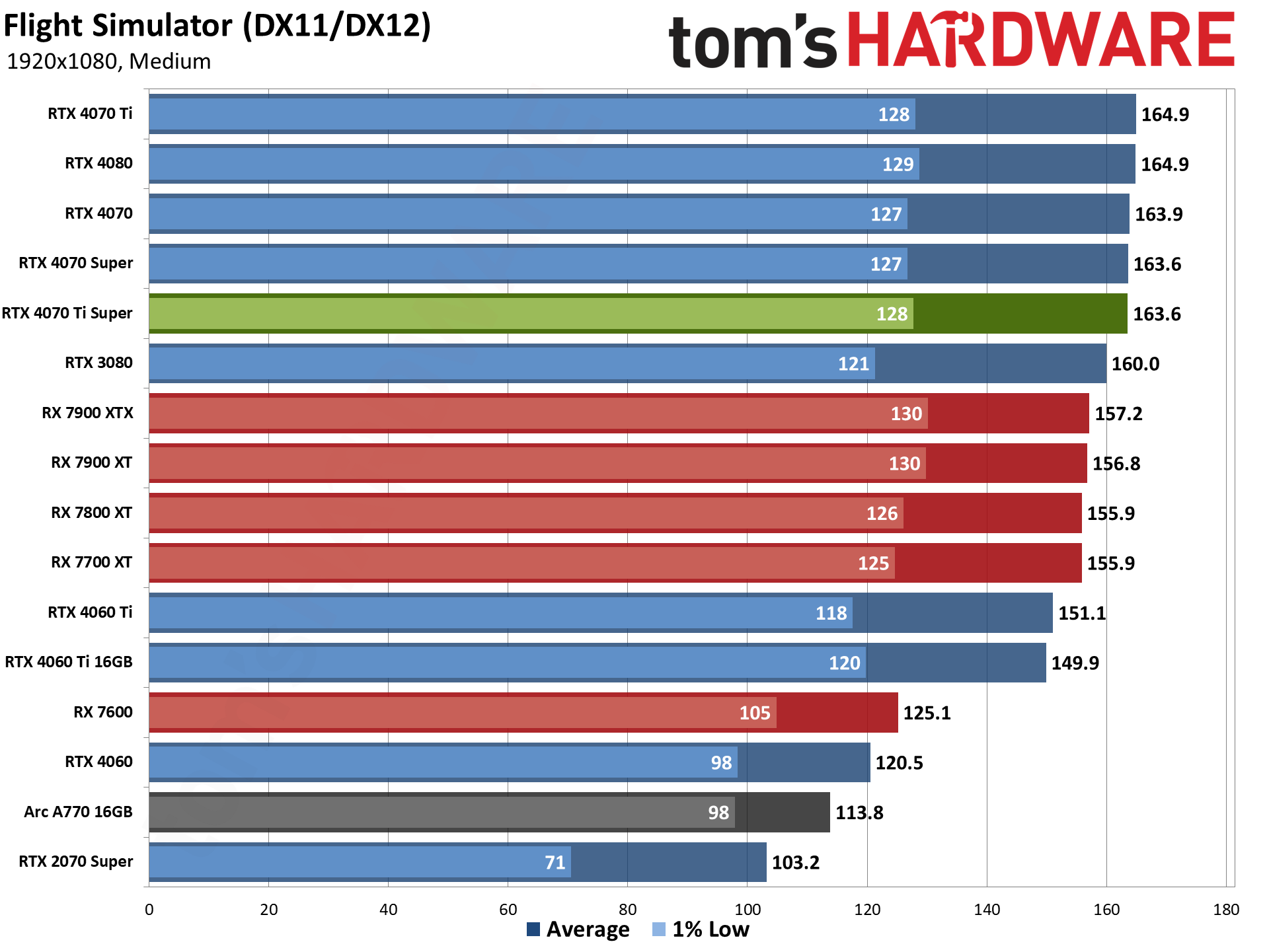
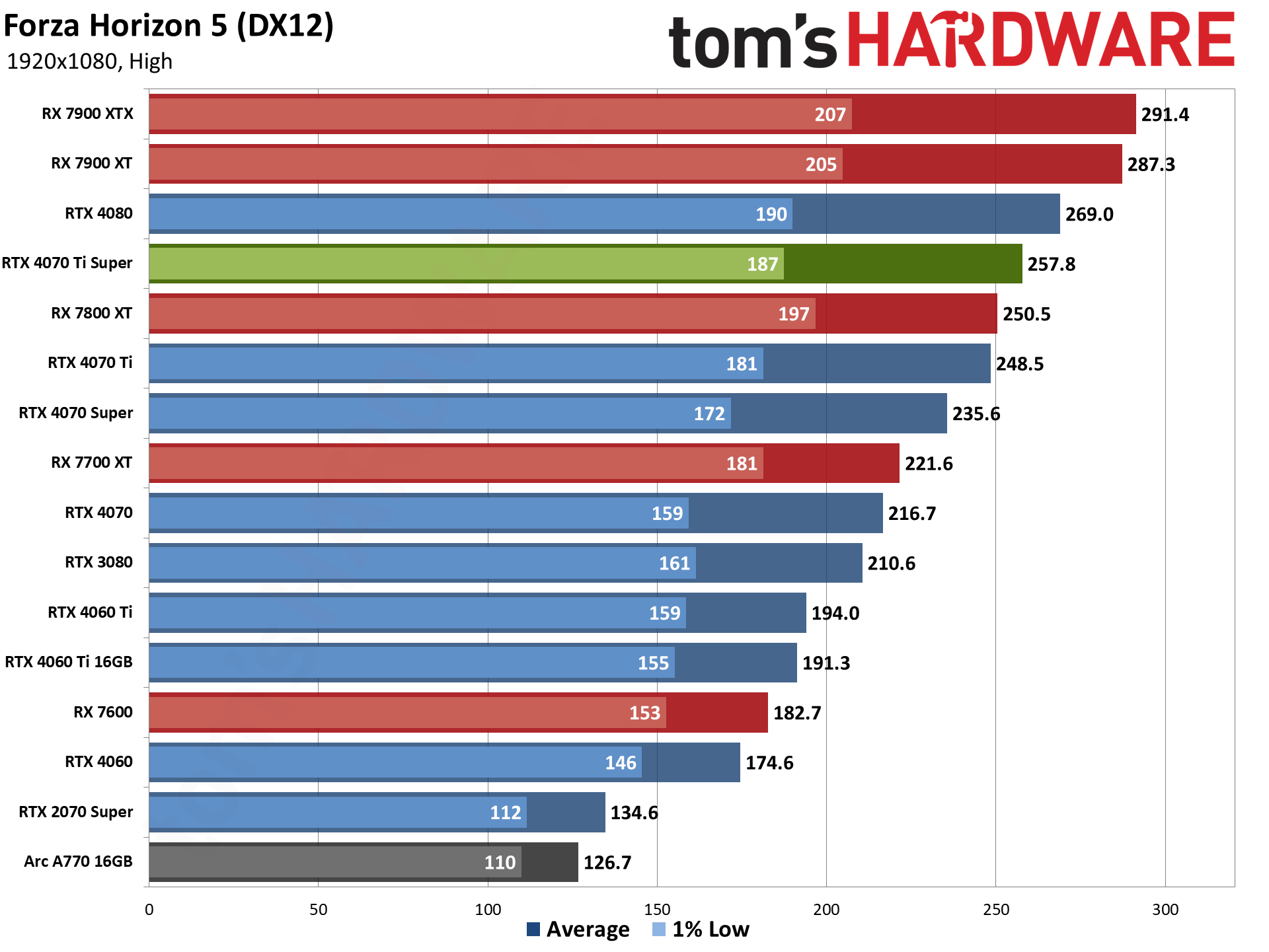
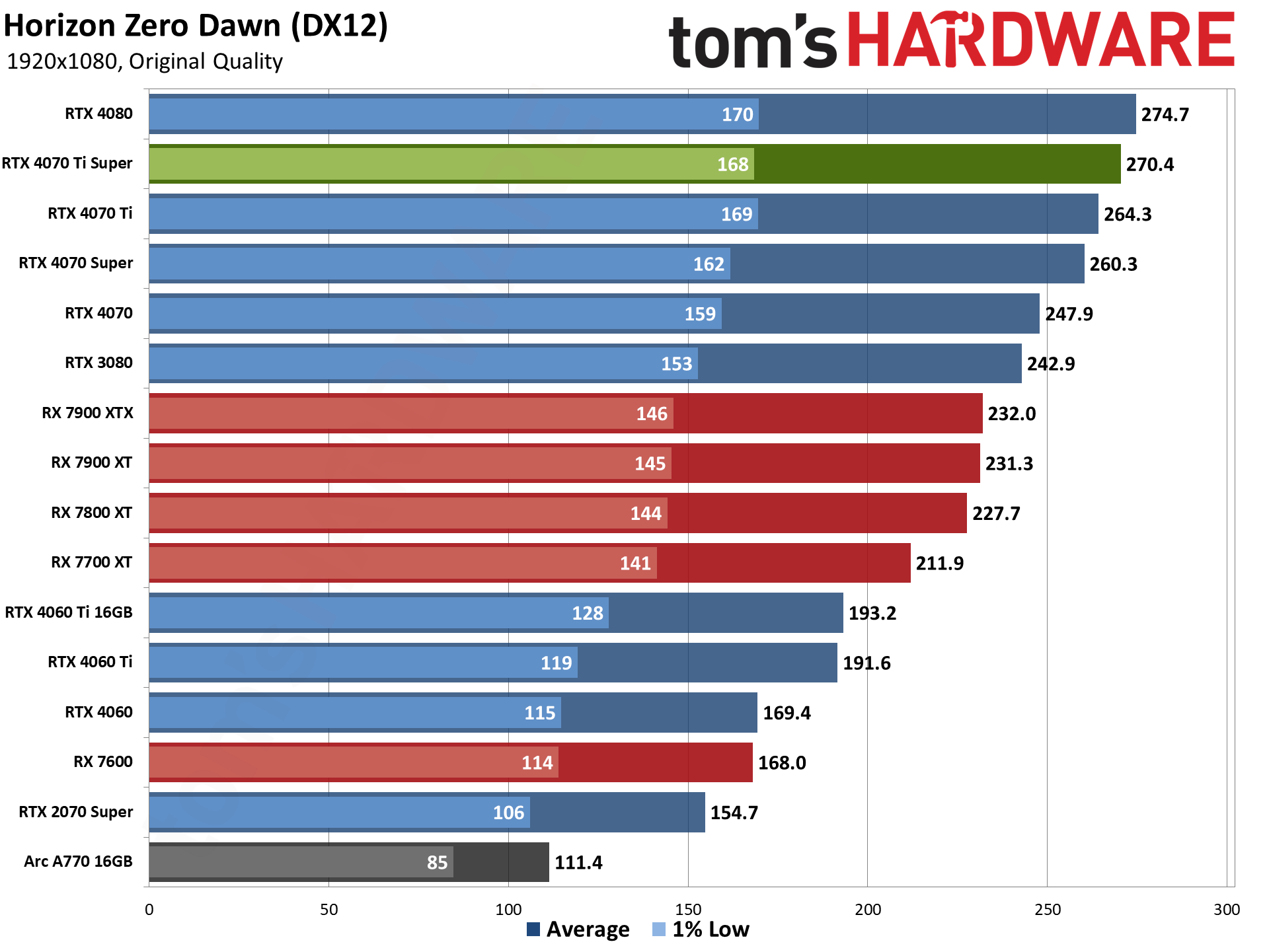
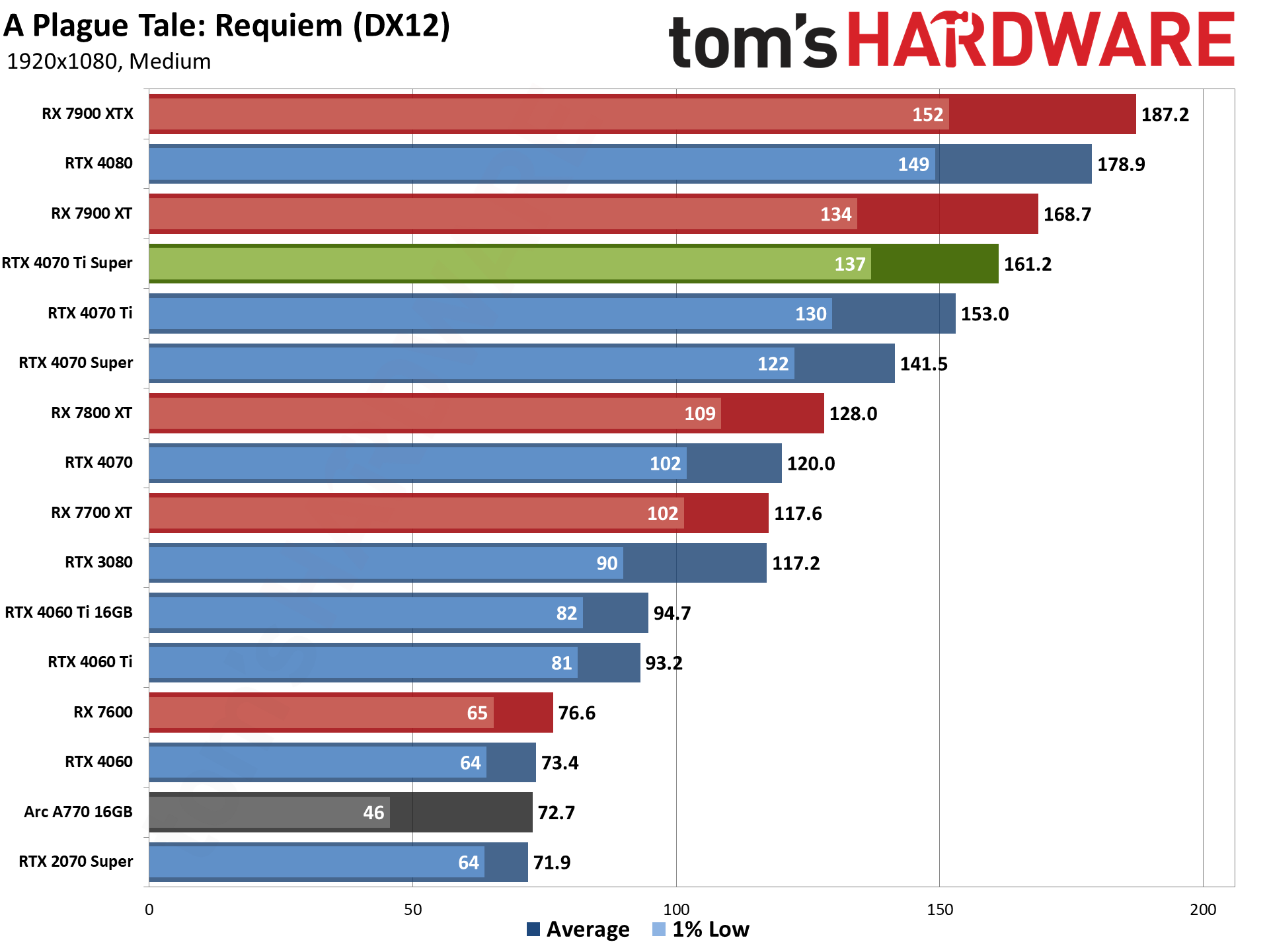
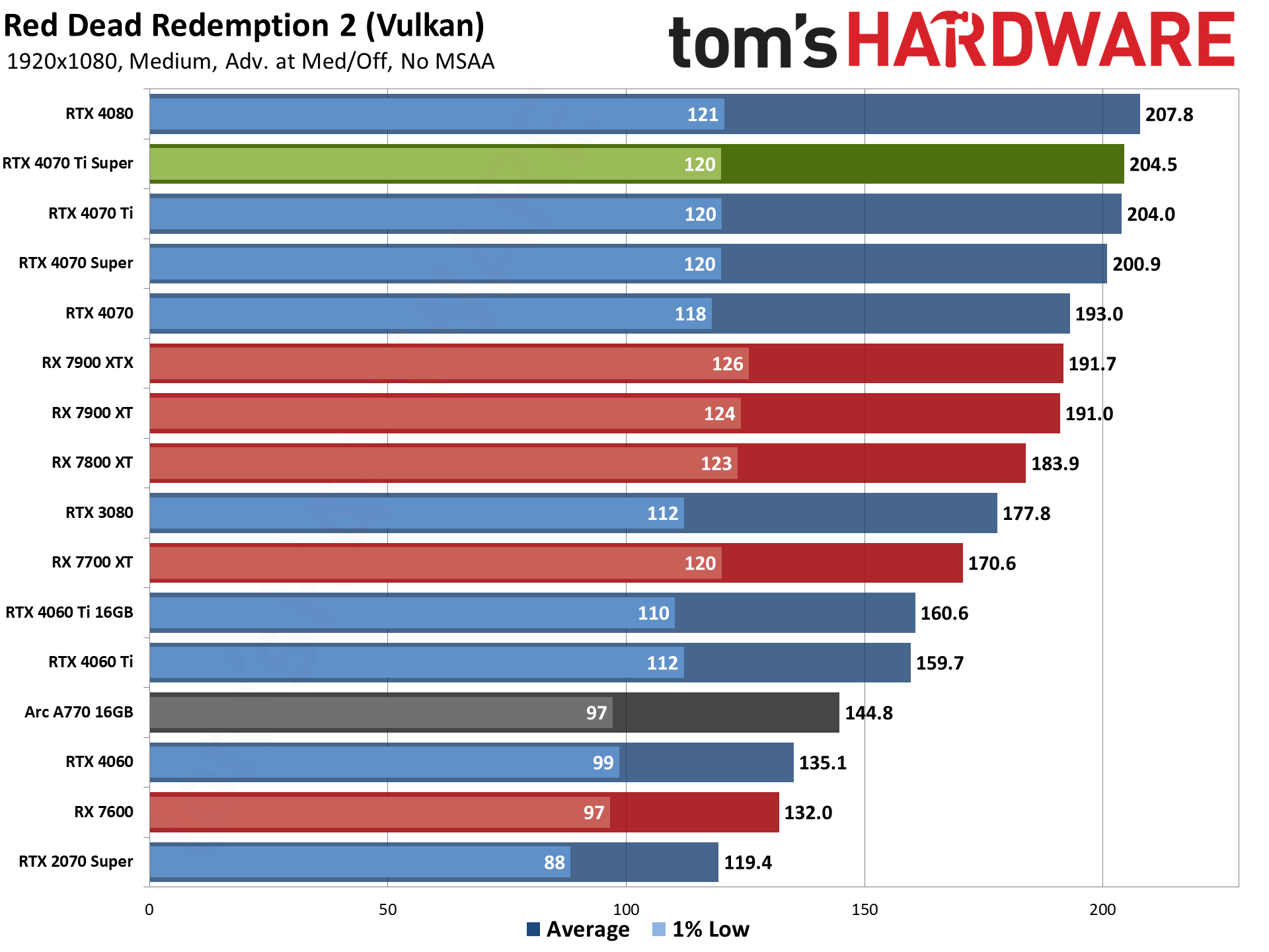
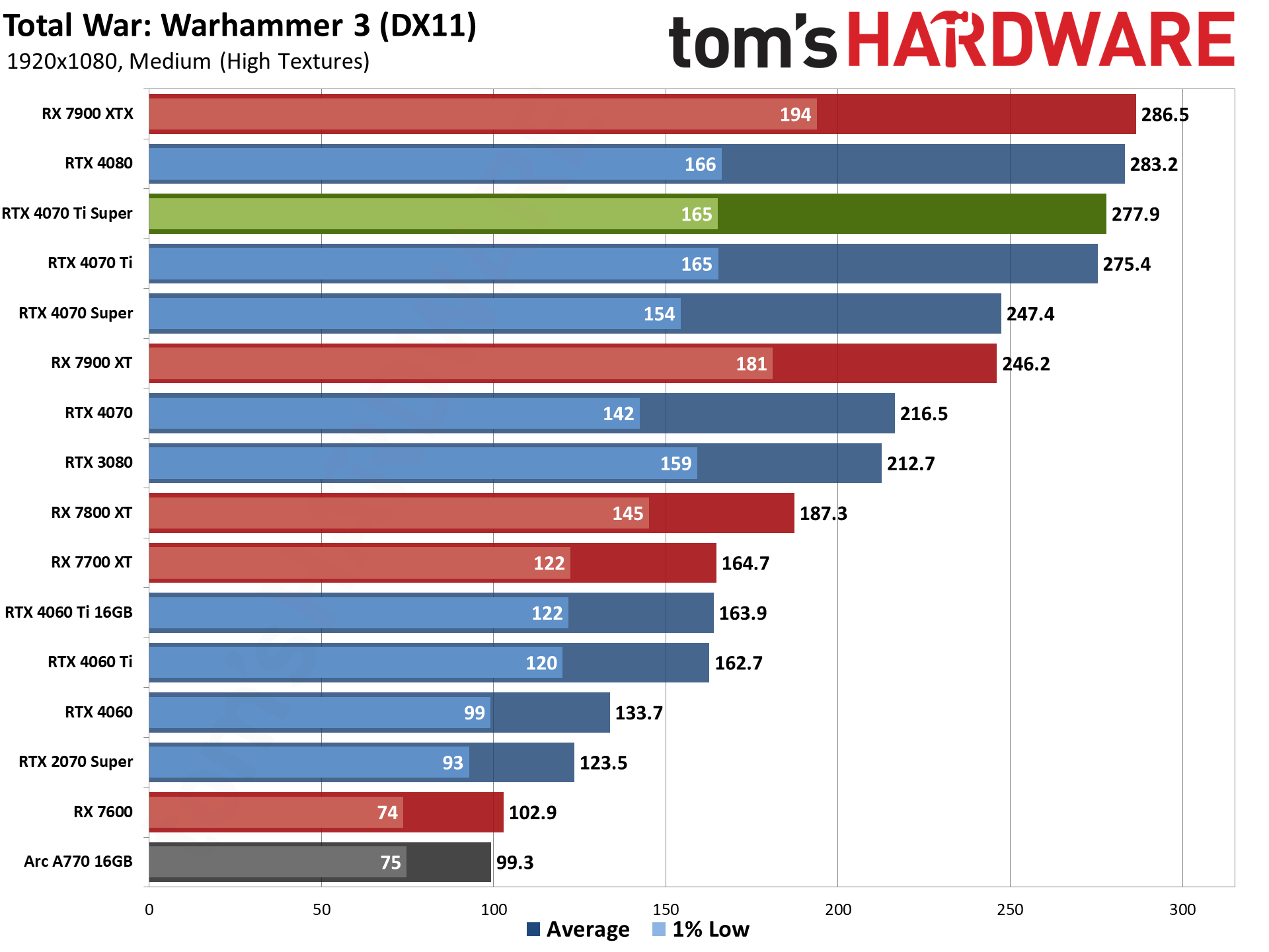
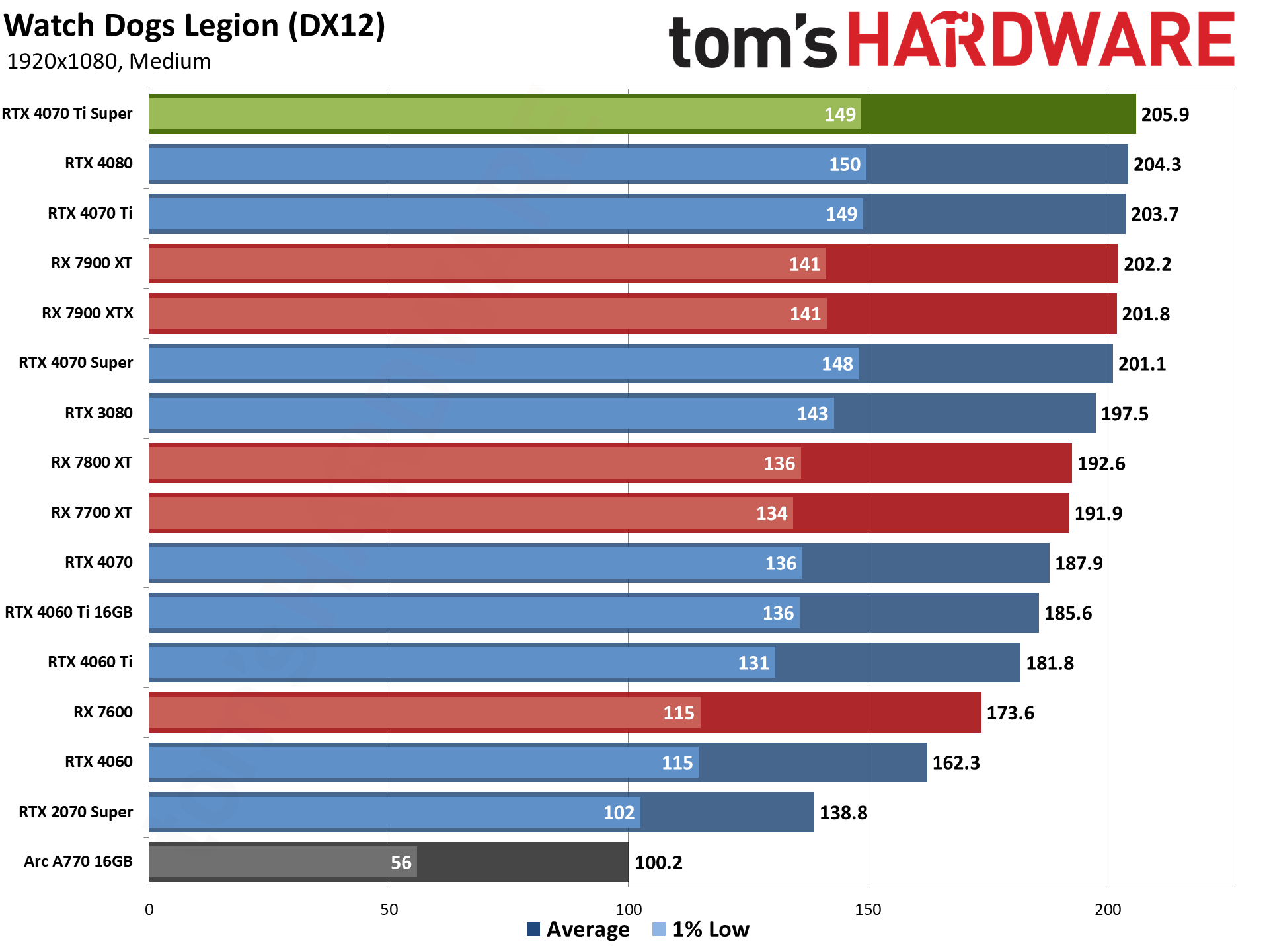
As evidenced by the overall numbers, margins have shrunk quite a bit for the rasterization test suite — several of the games are clearly hitting CPU bottlenecks. The 7900 XTX only leads Nvidia's new GPU by 5% at ultra settings, and they're basically tied (a 1% lead for AMD) at medium settings. The 4070 Ti Super is 5% faster than the 7900 XT at both ultra and medium.
Total War: Warhammer 3 continues to somewhat favor Nvidia's GPUs, but Horizon Zero Dawn actually shows the biggest swing: Where the 7900 XTX was faster at 1440p and 4K, the 4070 Ti Super is faster at 1080p — by double digit percentages. Overall, the new Nvidia GPU ranges from 9% slower to 15% faster than the 7900 XT at ultra settings, and 5% slower to 17% faster at medium settings.
Differences between the vanilla and Super variants of the 4070 Ti are all in the single digit percentages at 1080p, ranging from no real difference or even a slight advantage (Flight Simulator), to at most a 9% lead (Borderlands 3). The RTX 4080 meanwhile ranges from tied to as much as 12% faster (again, BL3).
RTX 4070 Ti Super 1080p Ray Tracing Performance
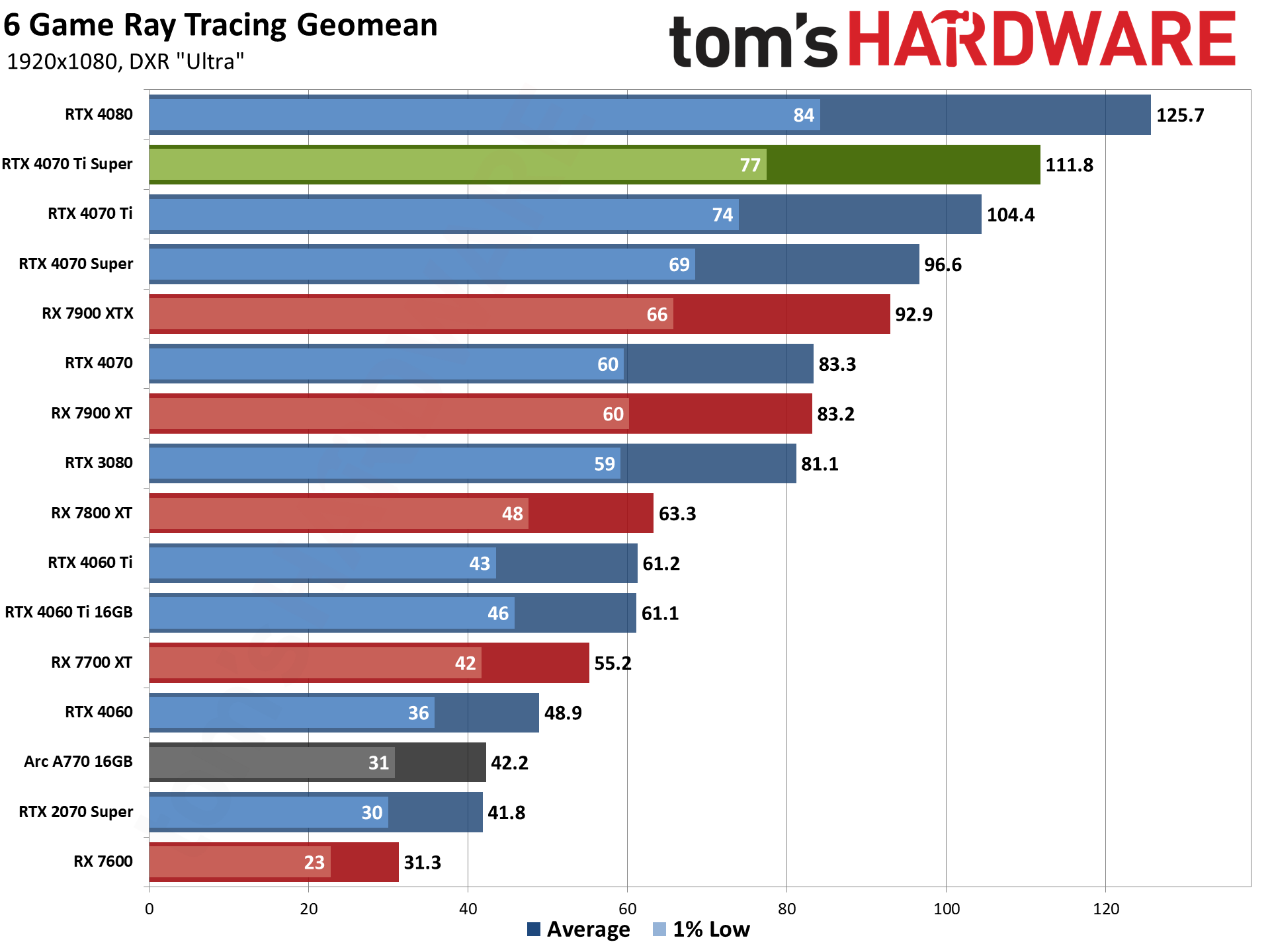
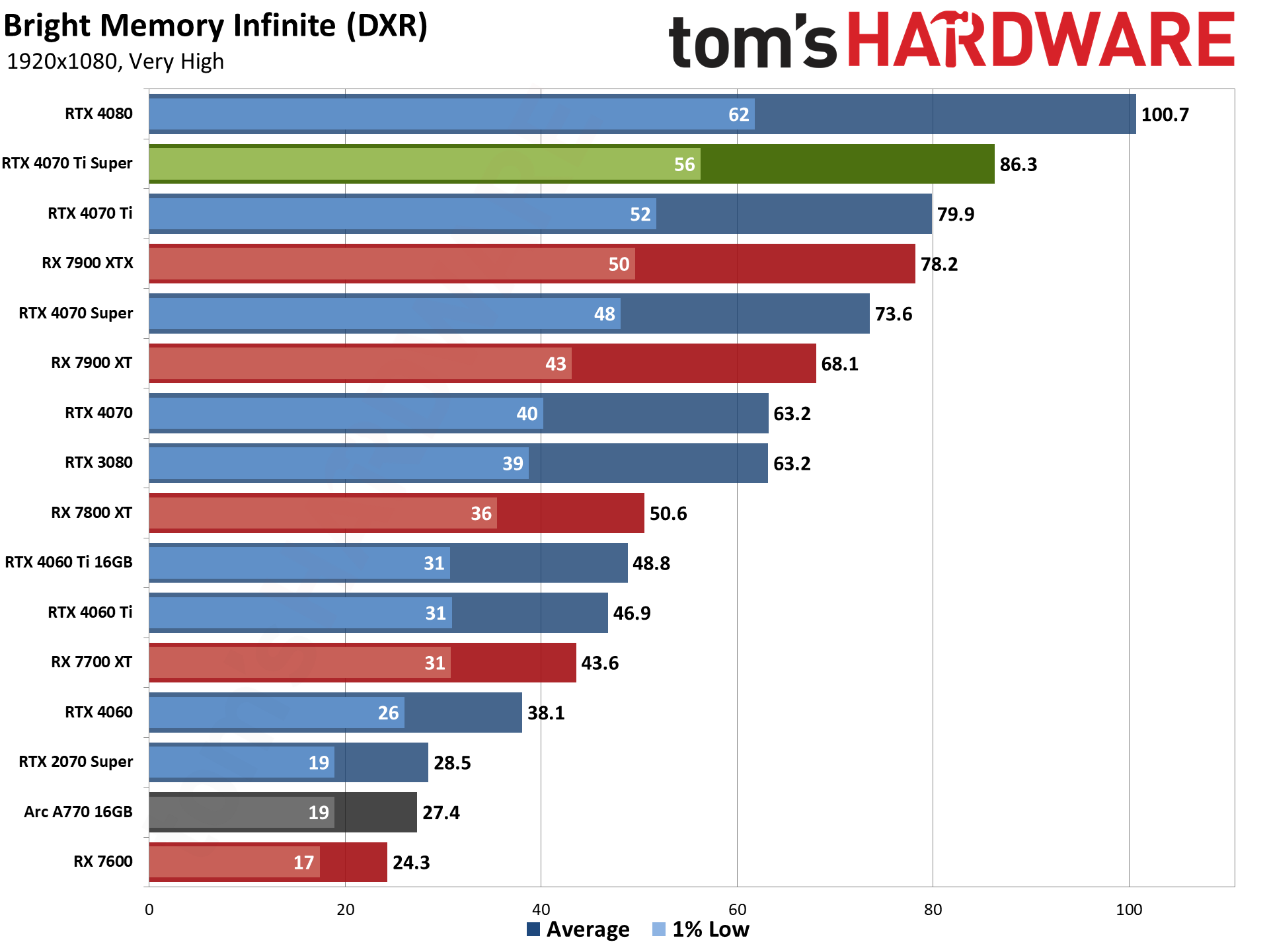
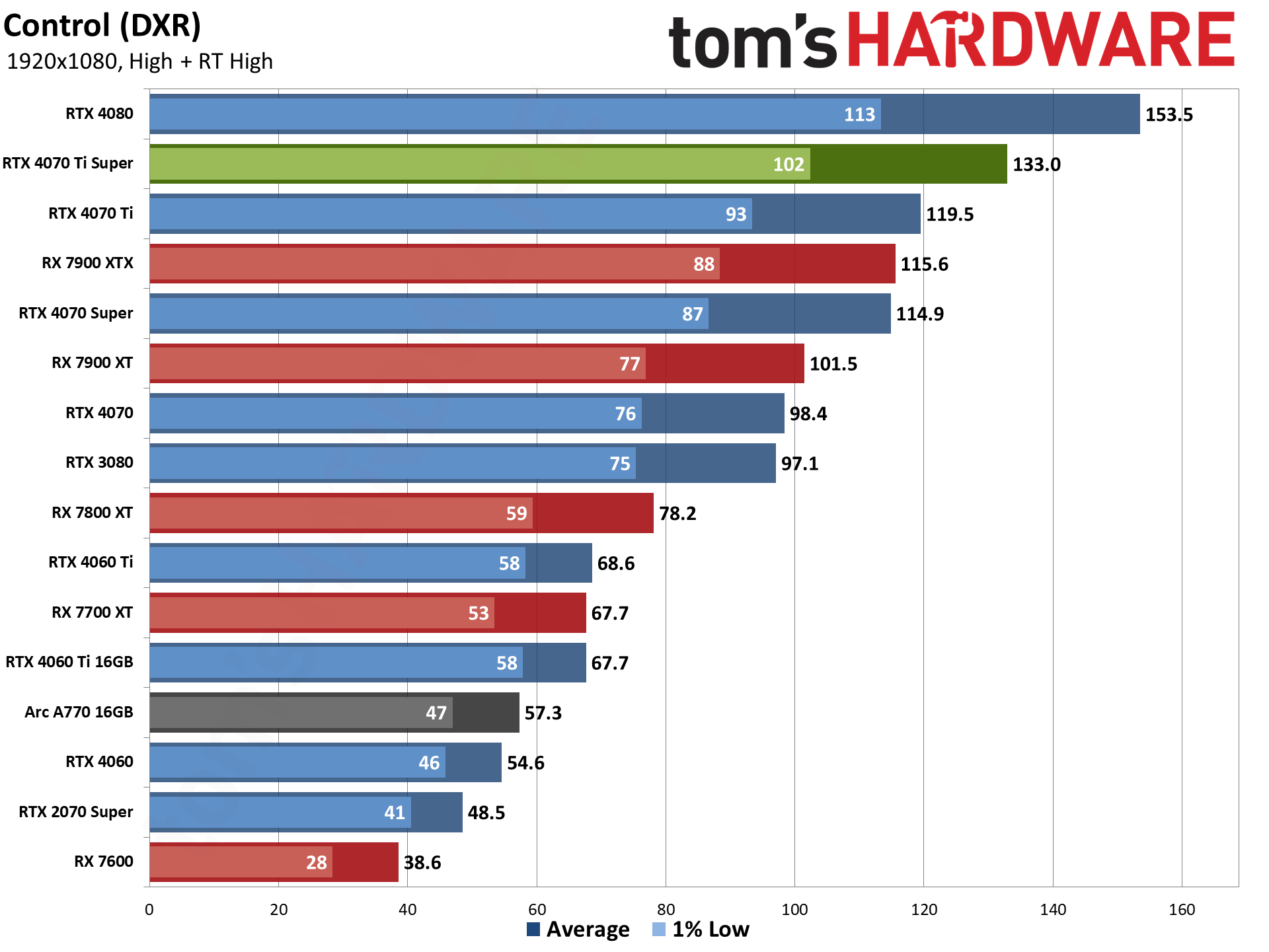
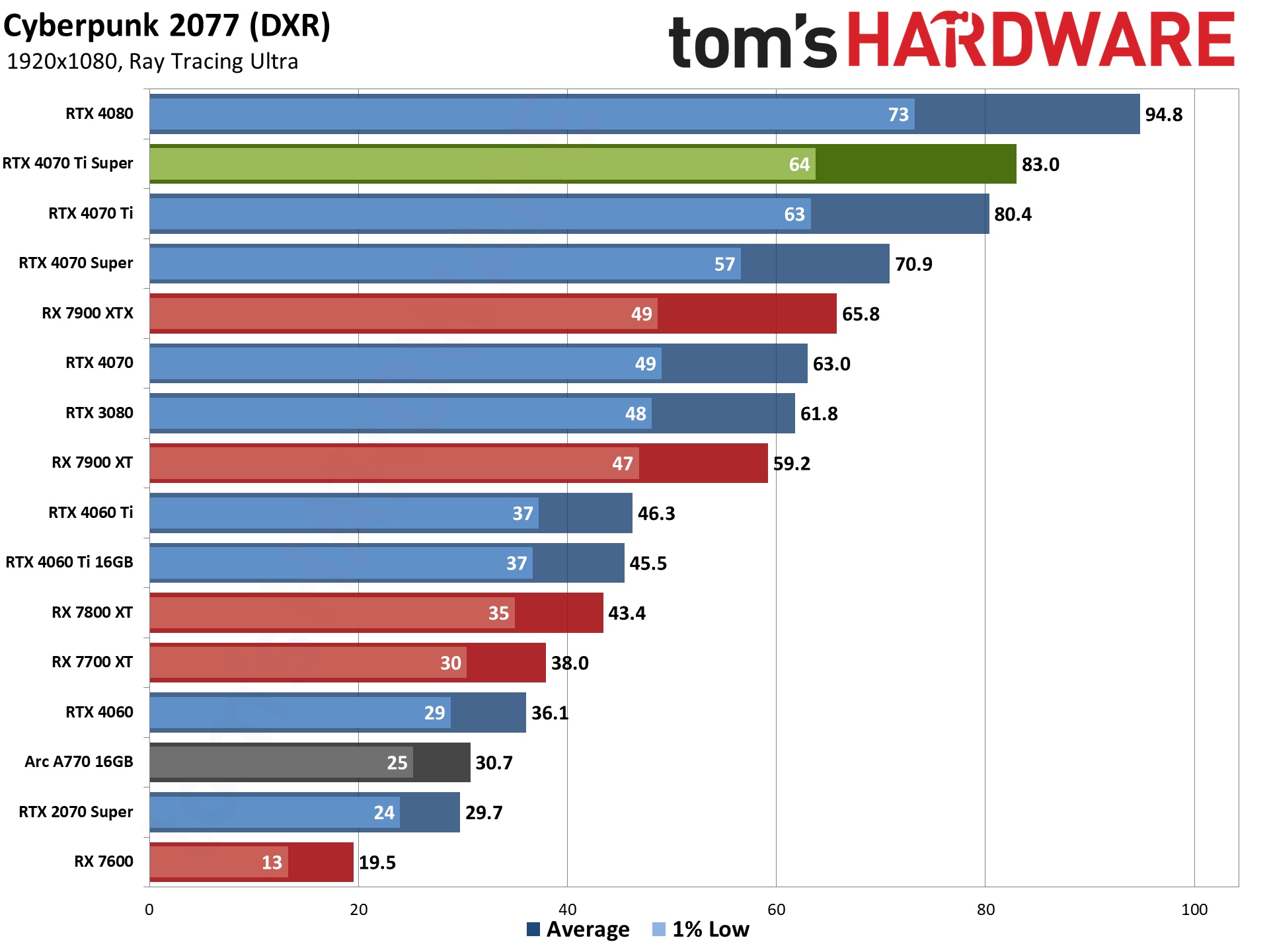
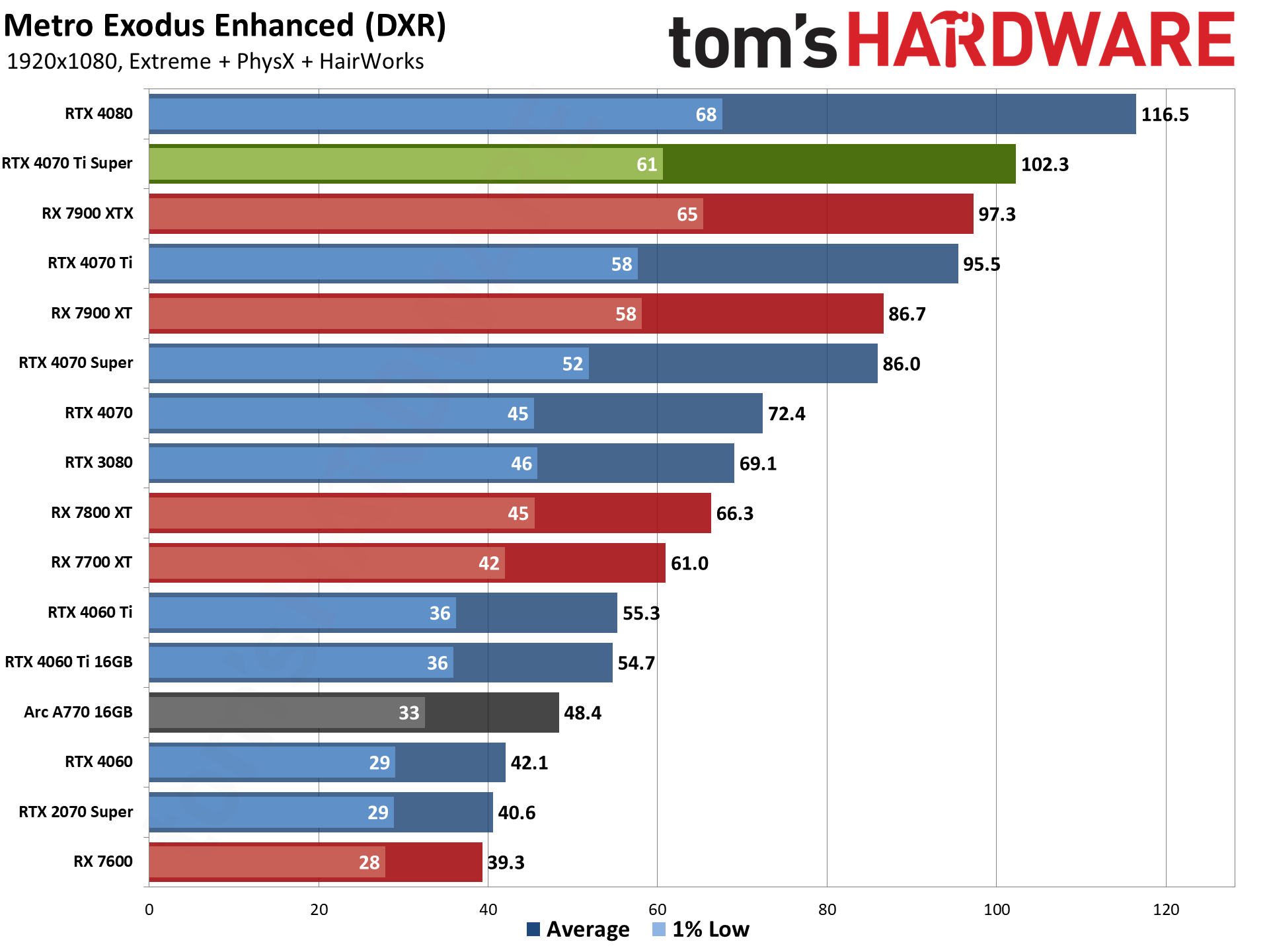
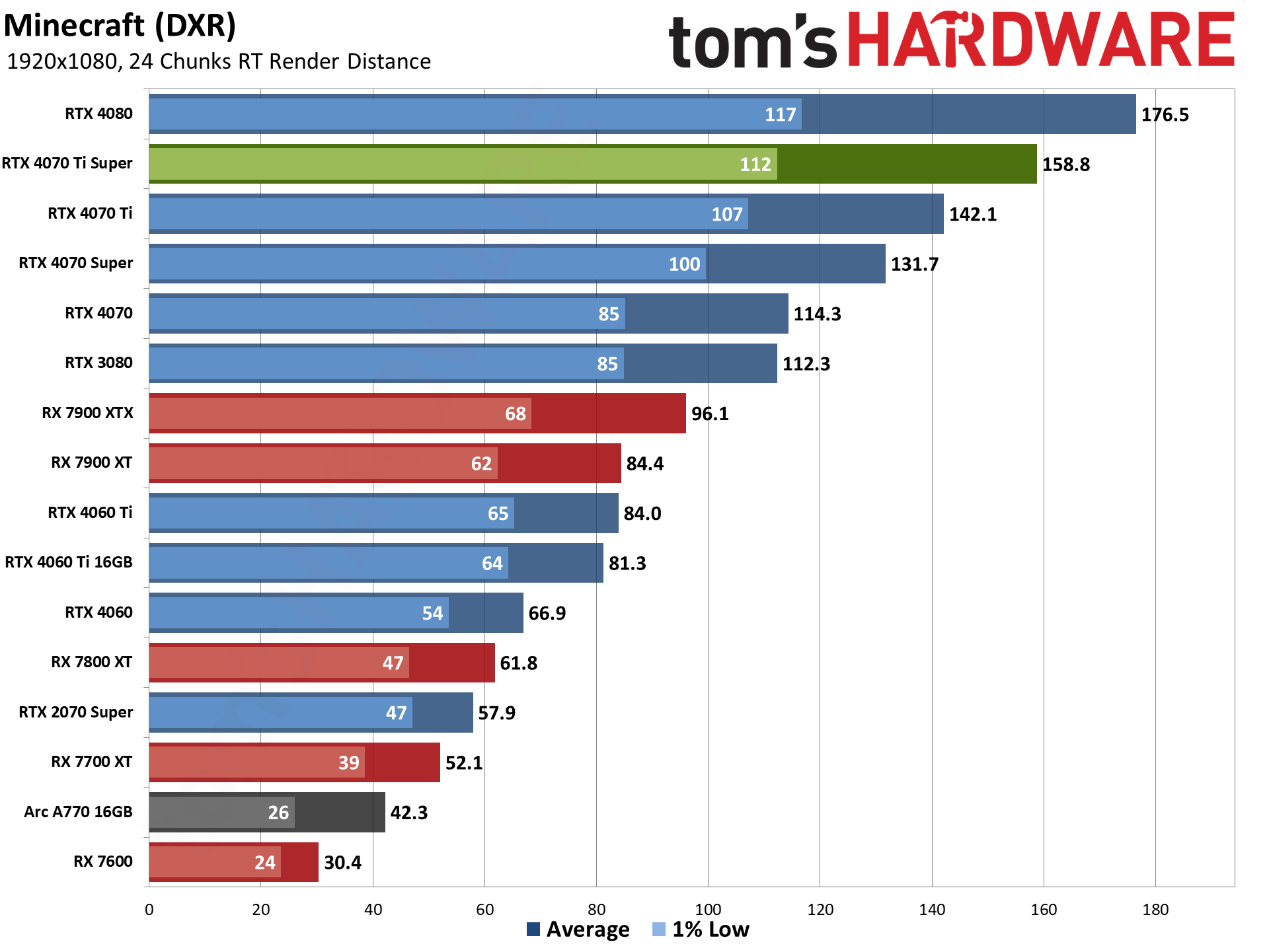
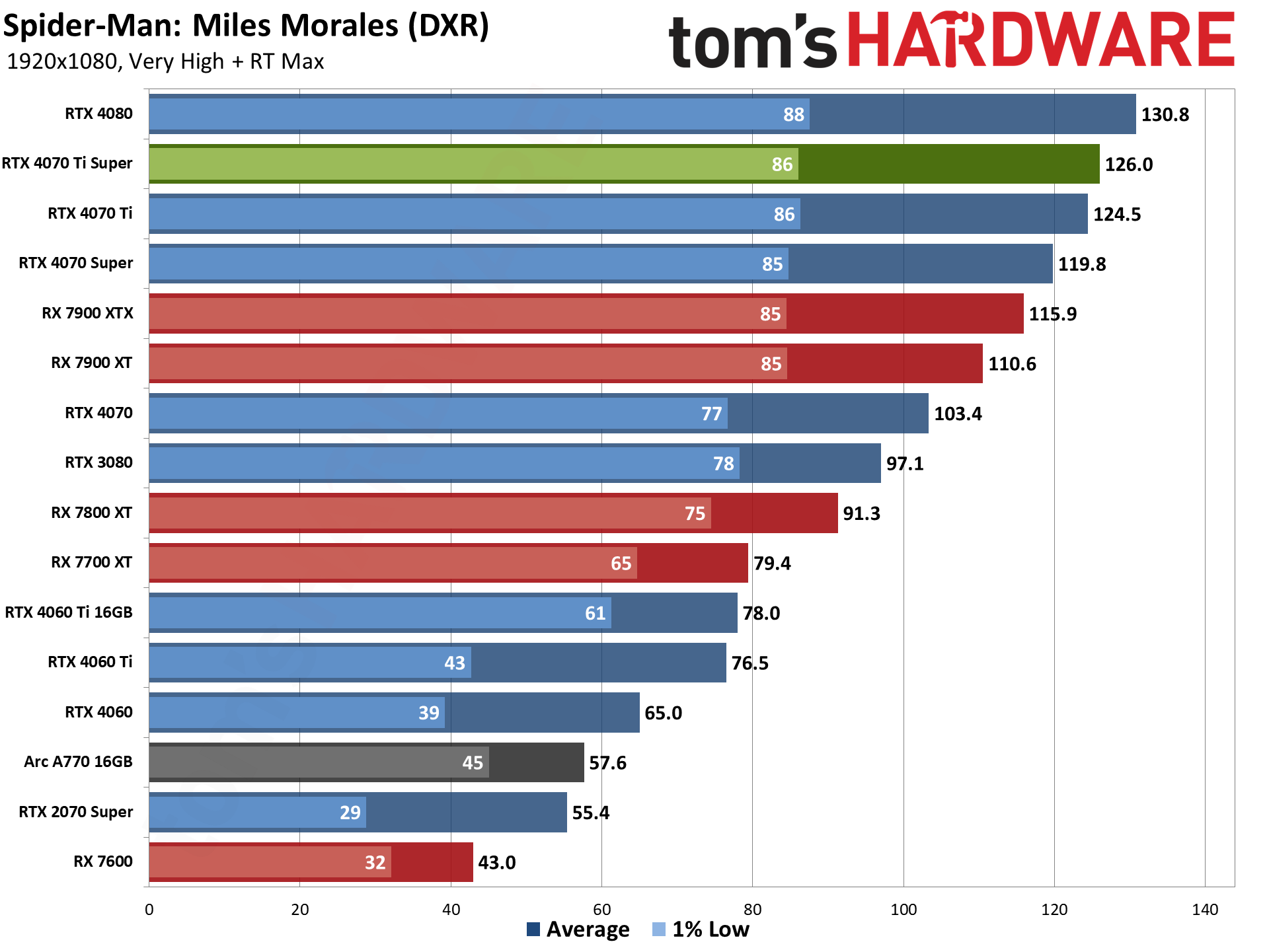
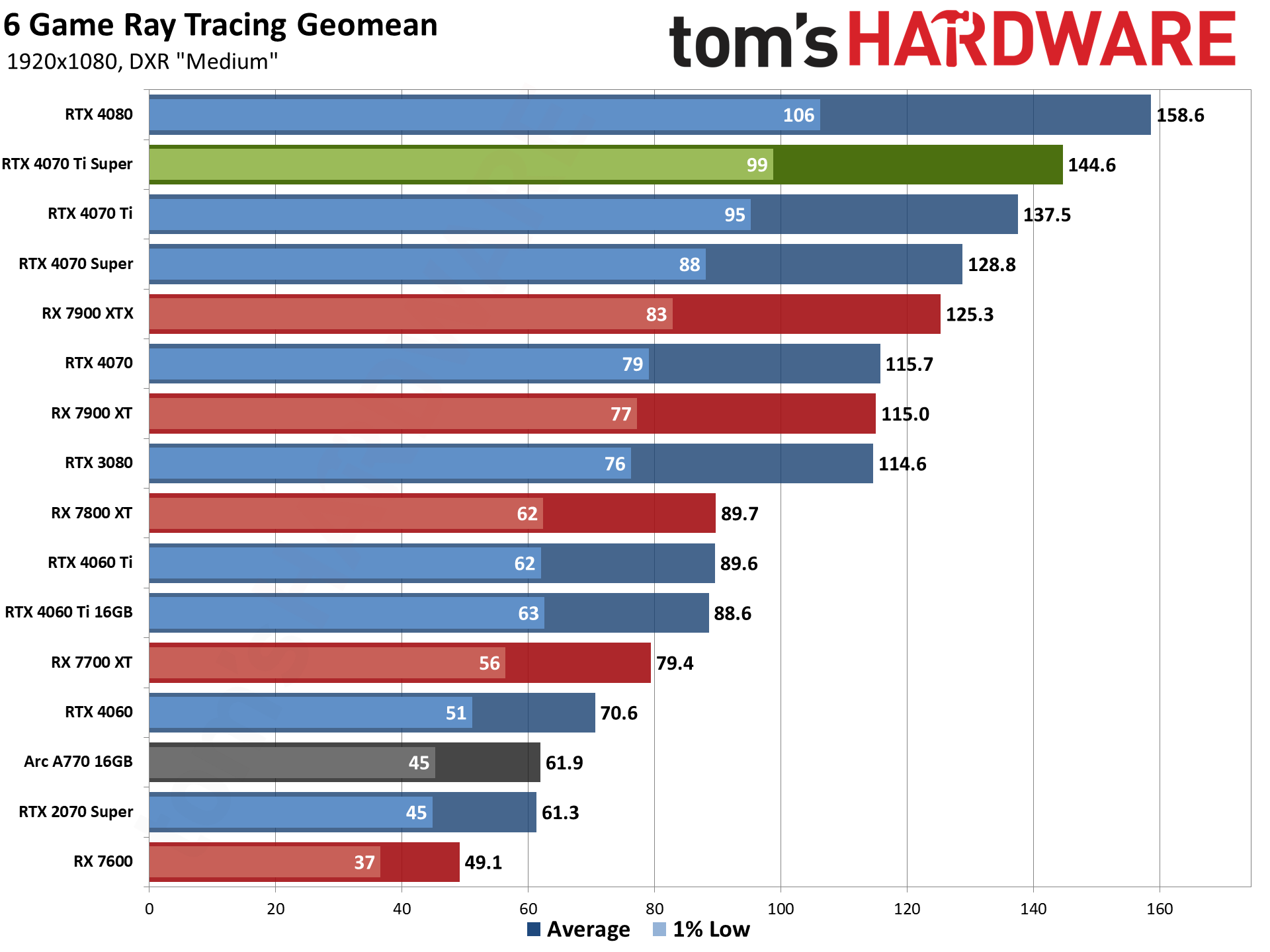
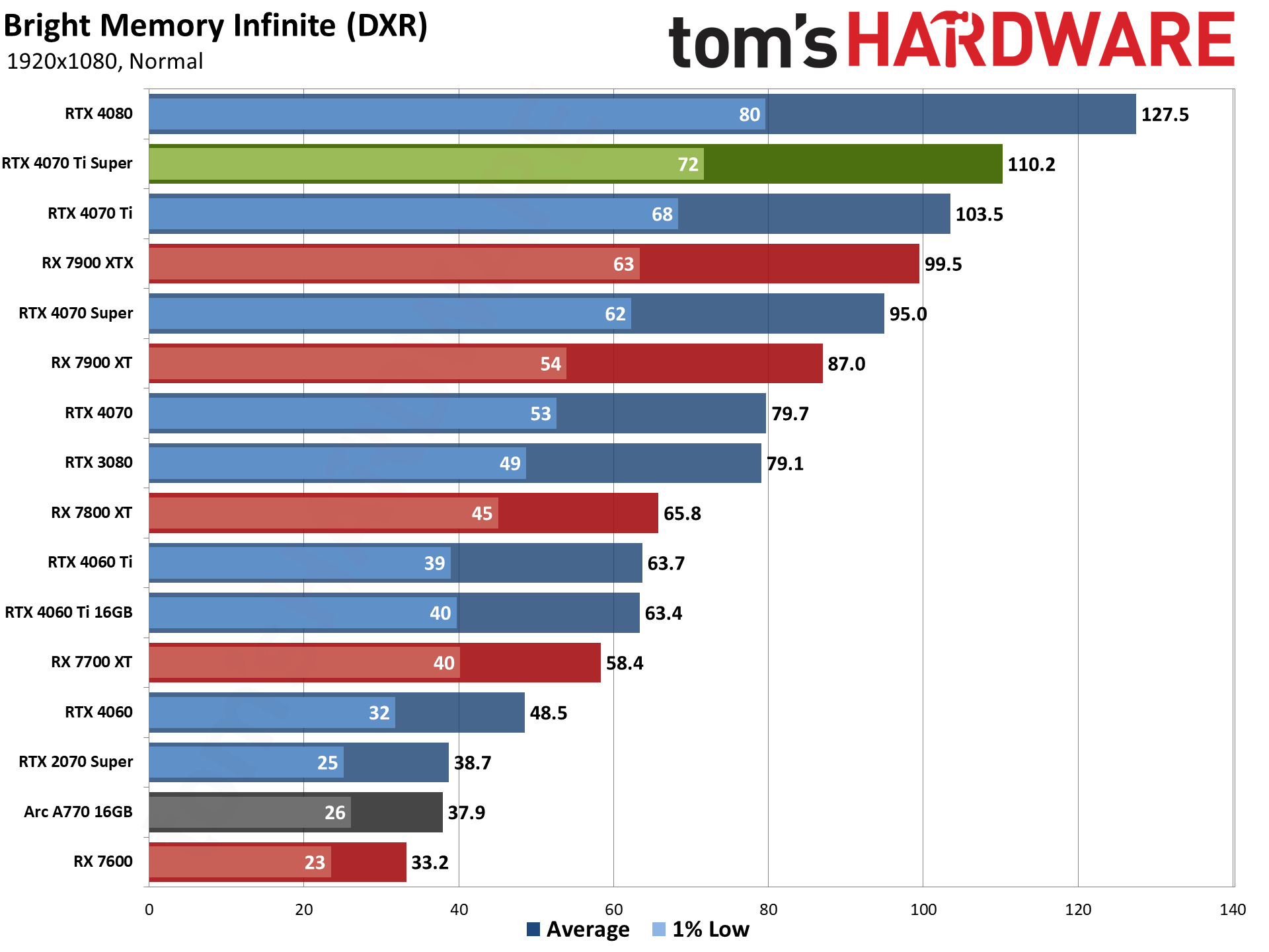
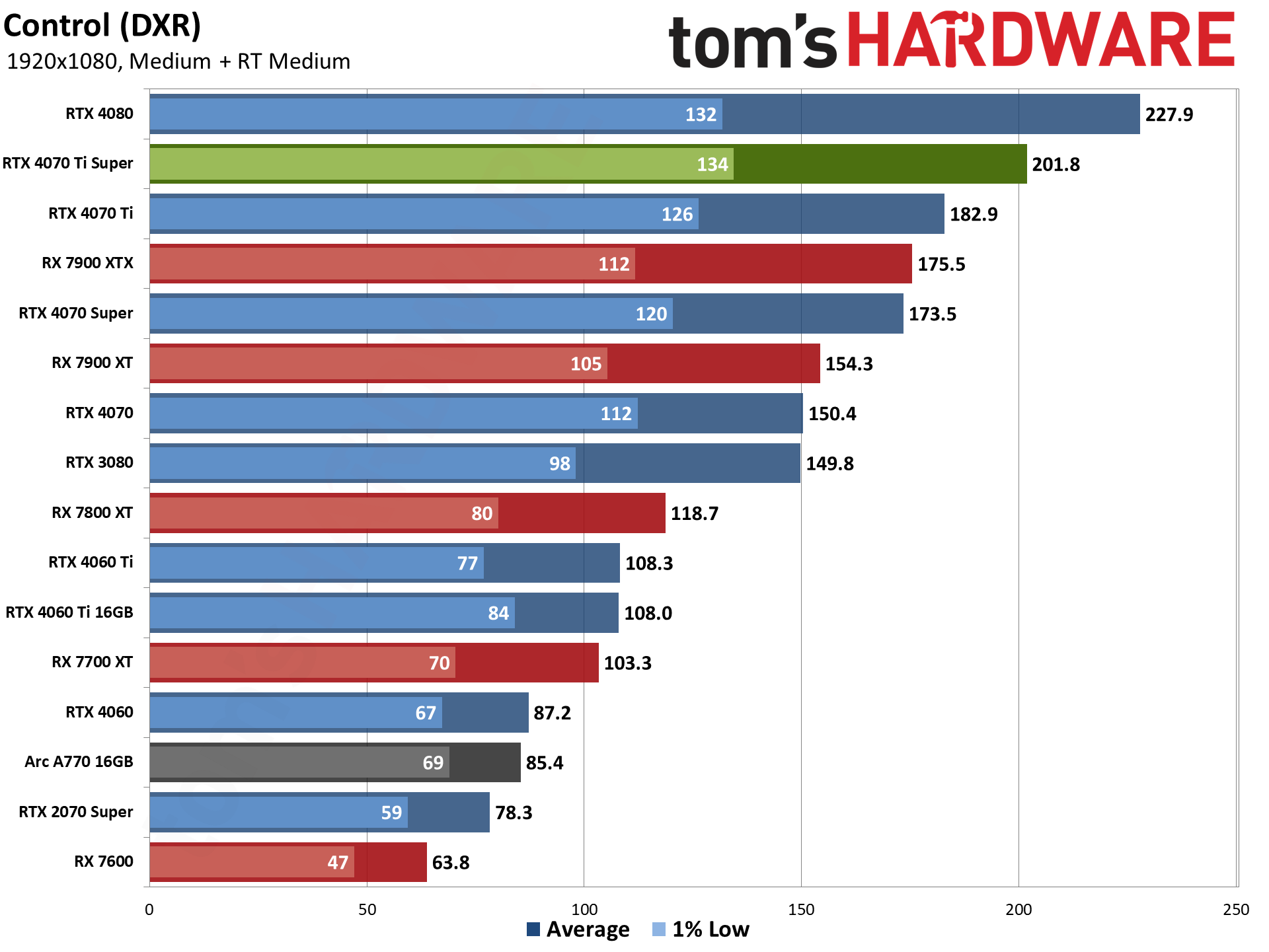
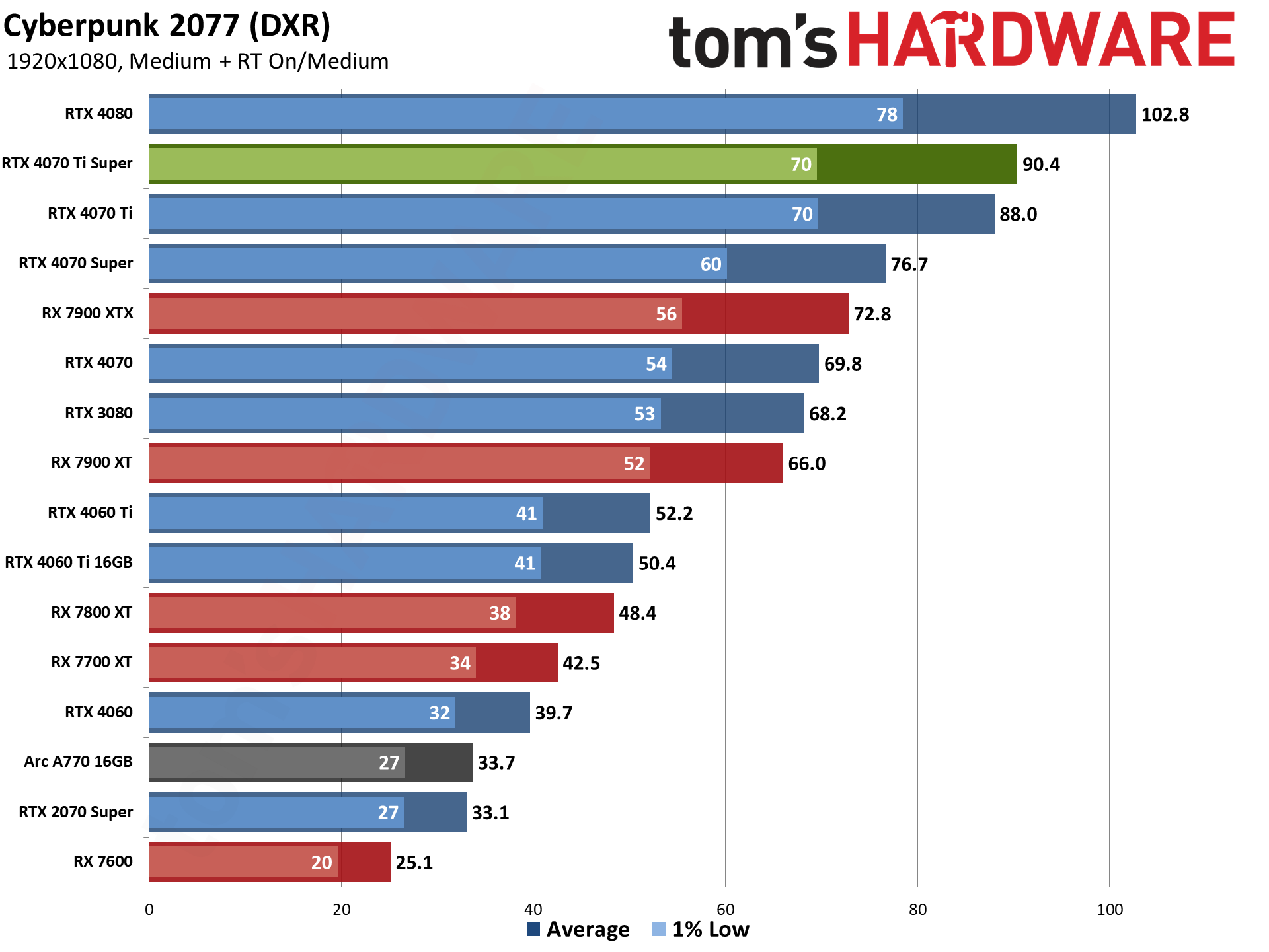
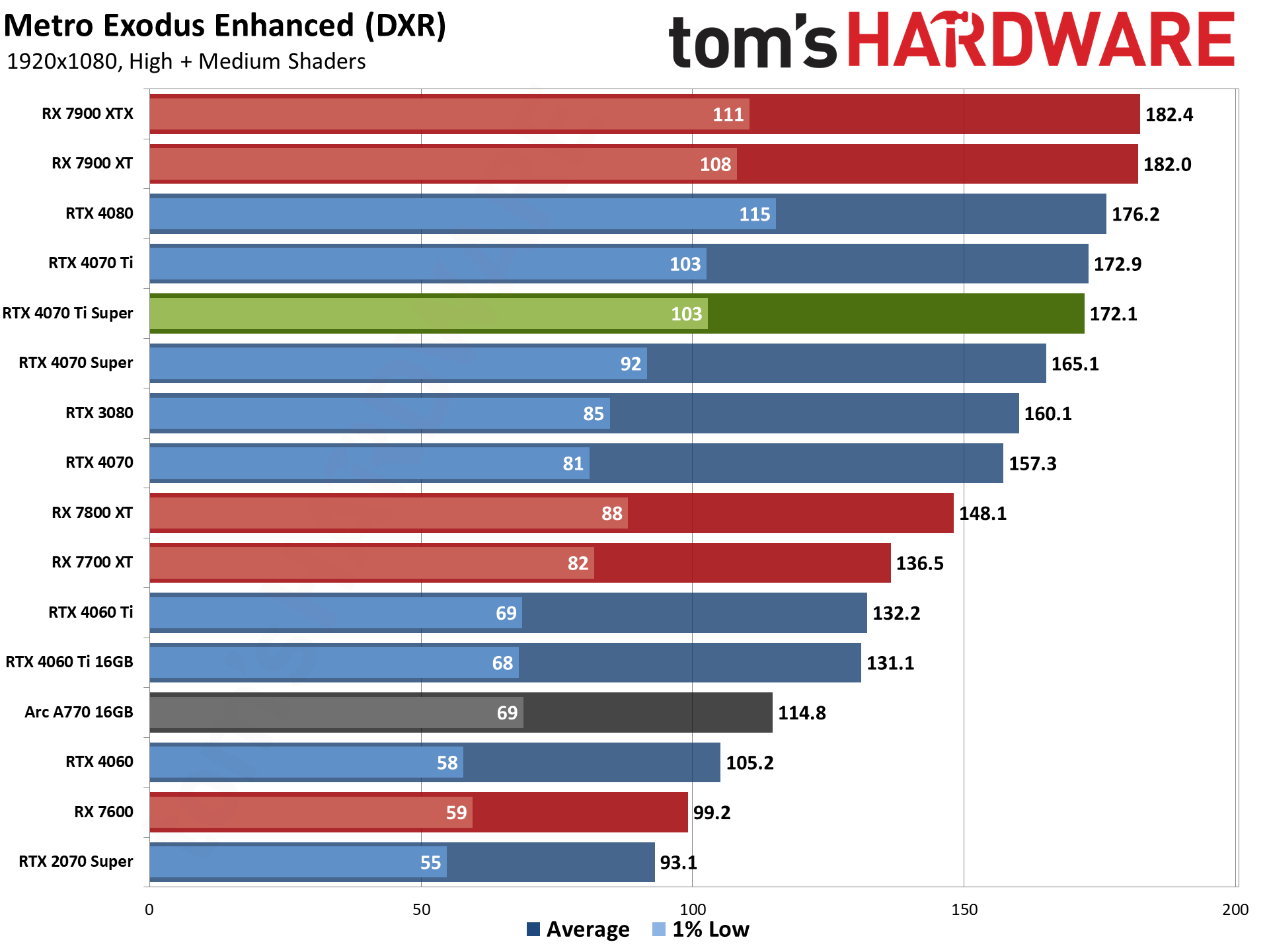
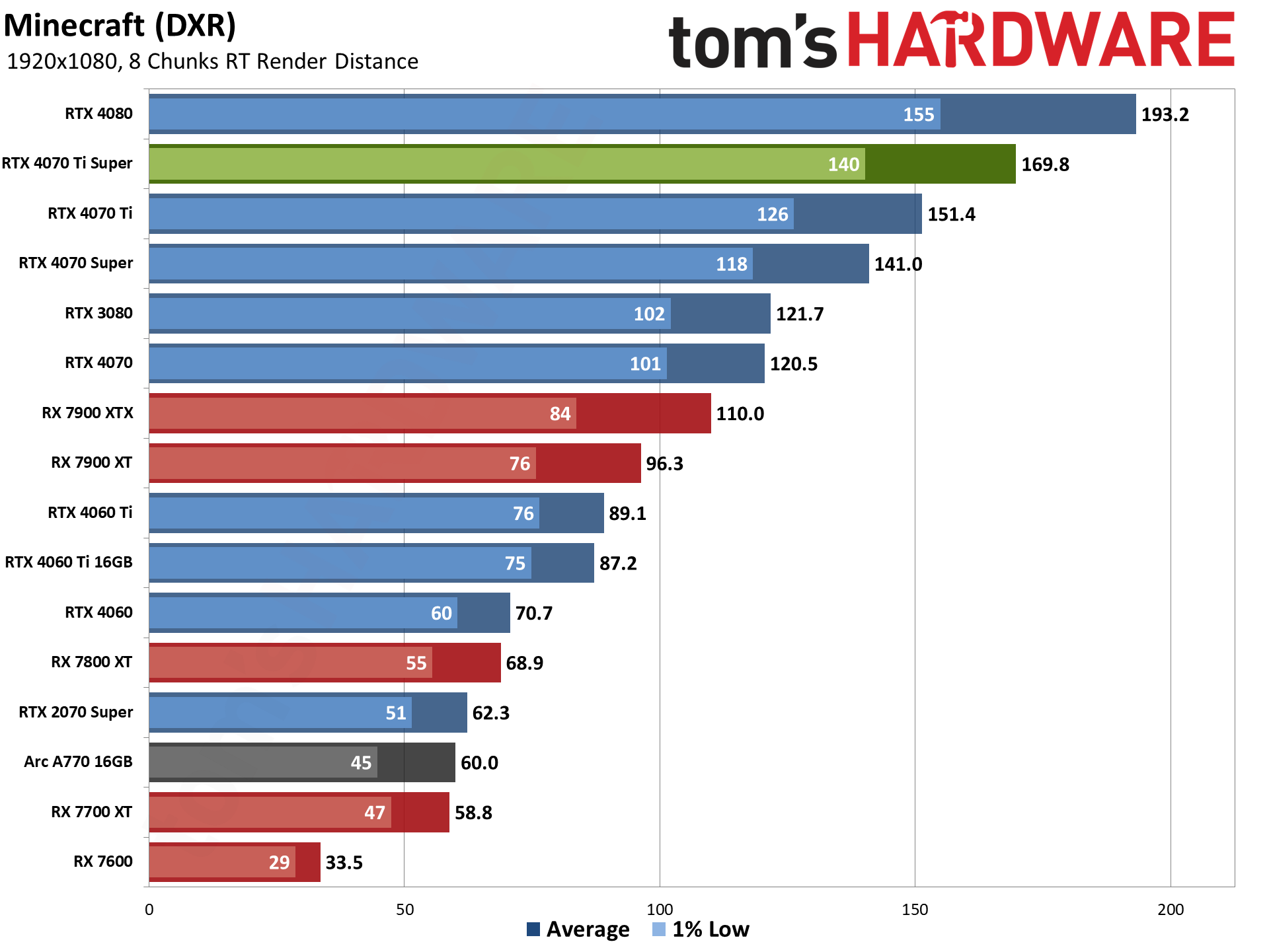
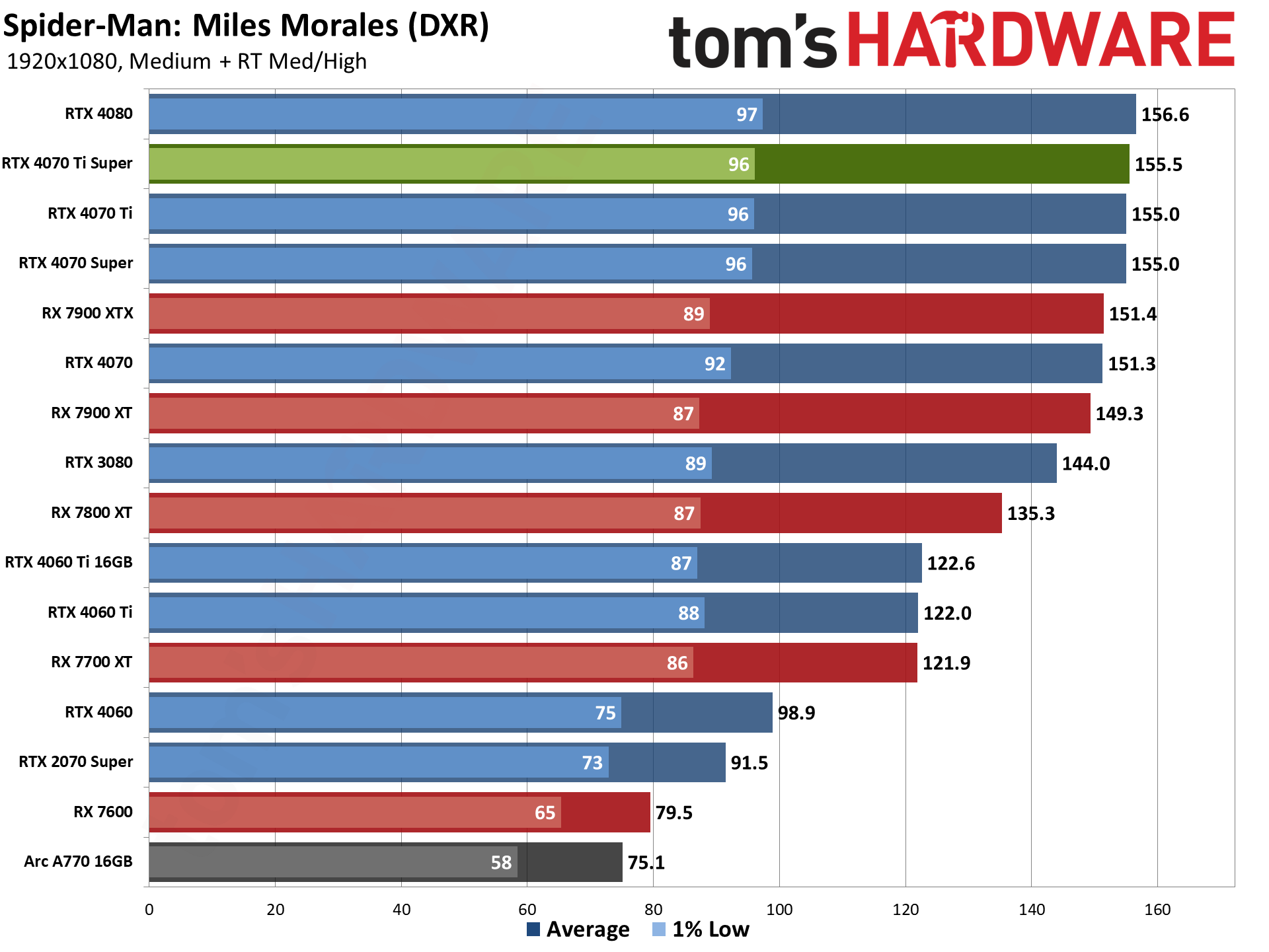
Even at 1080p, ray tracing can still be pretty demanding, and so the margins are a bit better than in the rasterization tests. The 4070 Ti Super leads the vanilla model by 5% at medium and 7% at ultra, and trails the 4080 by 9% at medium and 11% at ultra.
Nvidia still holds on to a 15% (medium) and 20% (ultra) advantage over the 7900 XTX, but much of that comes courtesy of the fully path traced Minecraft, which gives Nvidia a 54% to 65% lead. Cyberpunk 2077 also favors the 4070 Ti Super by around 25%, Control shows a 15% lead, Bright Memory Infinite Benchmark drops to 10%, and Metro and Spider-Man are in the single digits — with medium settings actually favoring AMD by 6%.
Outside of more extreme levels of RT effects, then, AMD's GPUs generally handle 1080p quite a bit better. They're still generally slower than their Nvidia competition, but at least the 7900-series cards can manage very playable results.
RTX 4070 Ti Super 1080p Bonus Games
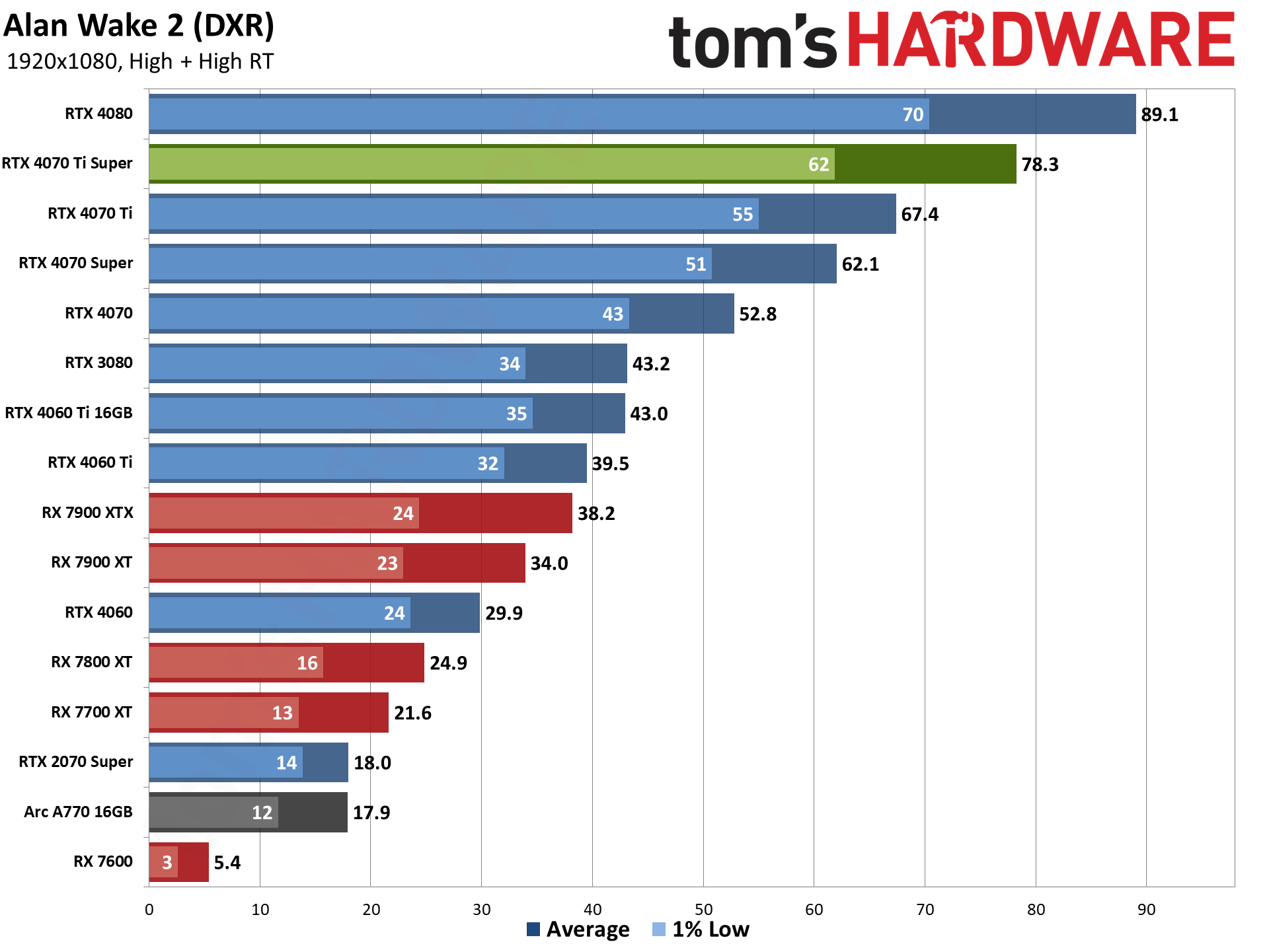
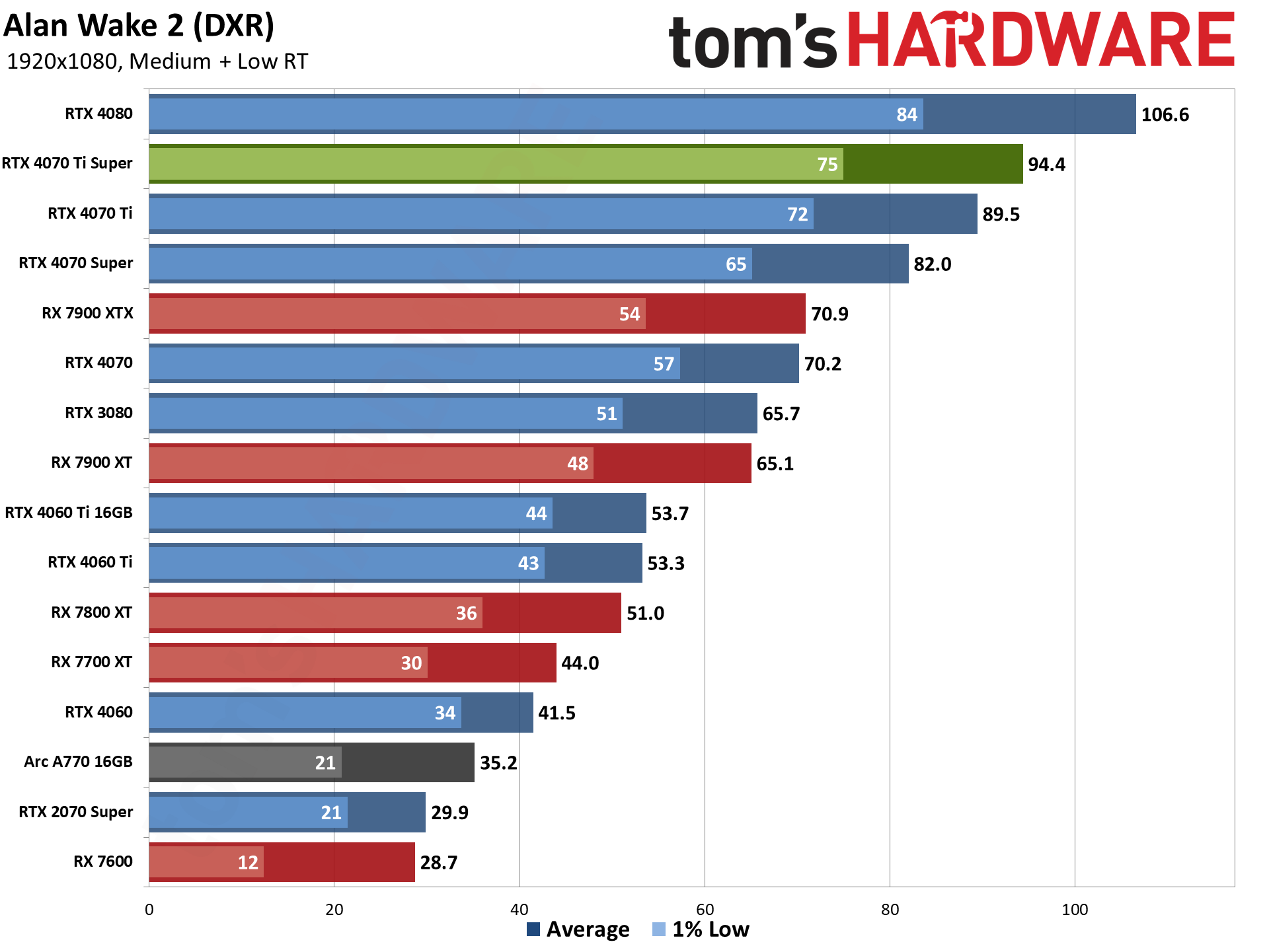
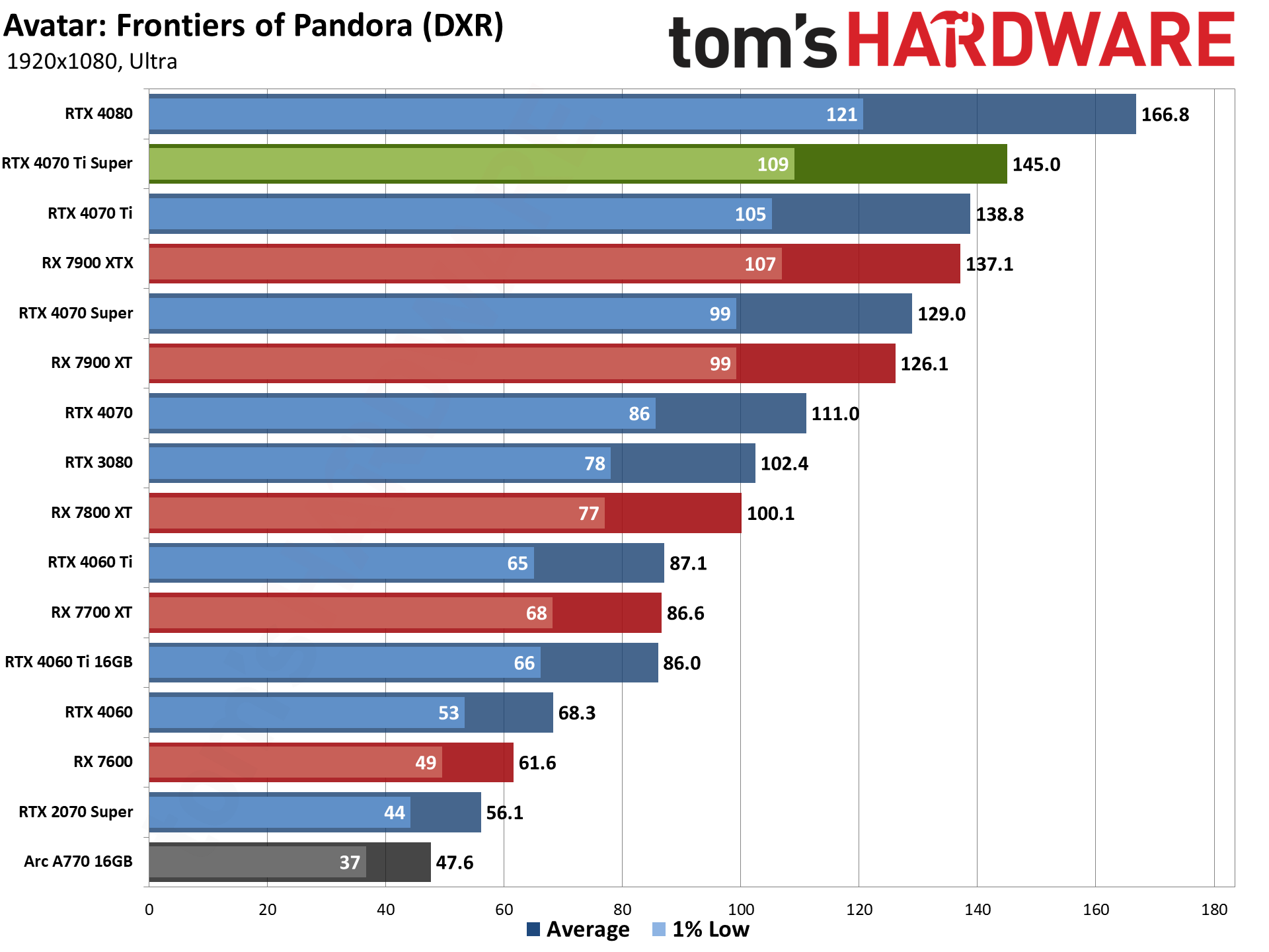
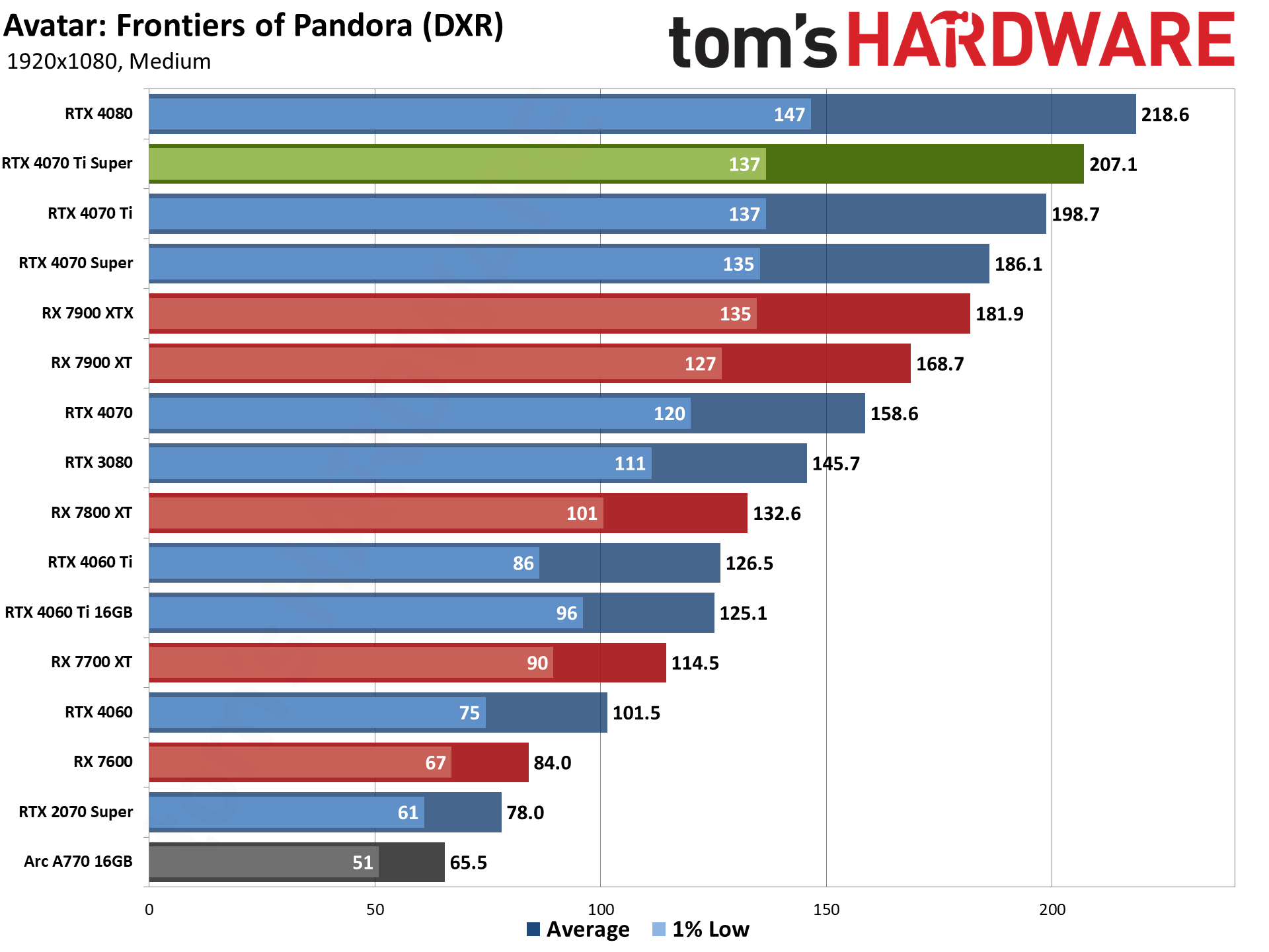
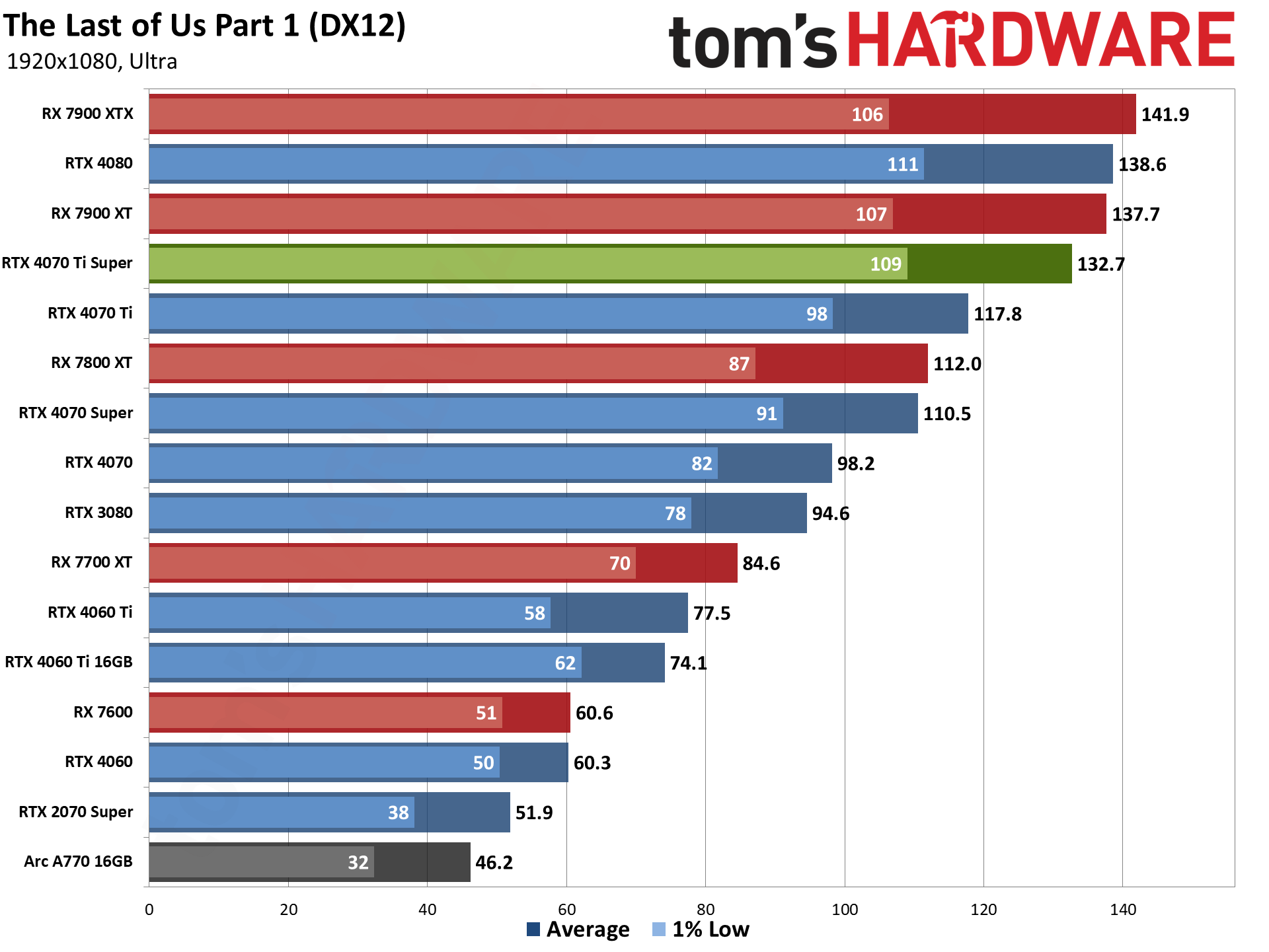
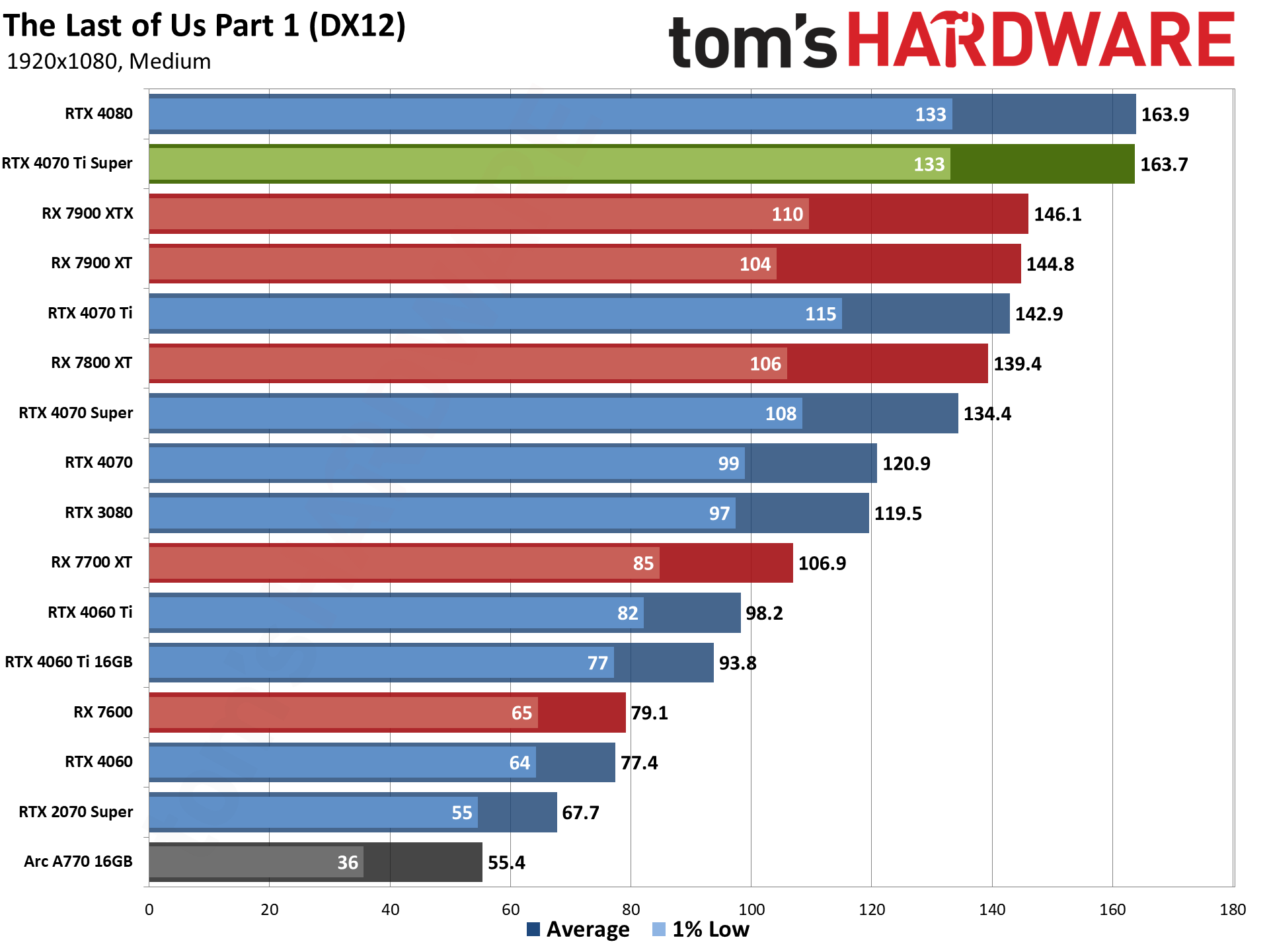
Alan Wake 2 is still punishing, even at 1080p, if you're trying to use high settings. The 4070 Ti Super is just over twice as fast as the 7900 XTX. Drop to medium with low RT and suddenly it's not nearly so bad, with the 4070 Ti Super leading AMD's best by 'only' 33% — with both rendering at 720p and using Quality mode upscaling.
And we should note that the reflections in particular look clearly superior on Nvidia's GPUs, indicating AMD's hardware isn't quite doing the same calculations (we've seen this in some other games as well) — it's especially noticeable in motion. Whether that's a game bug, a driver bug, or an architectural difference, we couldn't say.
Avatar has no problem hitting high fps at 1080p (720p upscaled), with 145 fps at ultra settings and over 200 fps at medium settings. The 4070 Ti Super comes out ahead of the 7900 XTX in both cases, however, because Avatar uses ray tracing for shadows and reflections.
And lastly, The Last of Us favors AMD's GPUs at ultra settings, with the 4070 Ti Super coming in several fps below the 7900 XT, though AMD seems to hit a CPU limit of around 145 fps at medium settings while Nvidia's fastest GPUs continue to scale to around 165 fps.
- MORE: Best Graphics Cards
- MORE: GPU Benchmarks and Hierarchy
- MORE: All Graphics Content
Get Tom's Hardware's best news and in-depth reviews, straight to your inbox.
Current page: Nvidia RTX 4070 Ti Super: 1080p Gaming Performance
Prev Page Nvidia RTX 4070 Ti Super: 4K Gaming Performance Next Page Nvidia RTX 4070 Ti Super: Professional Content Creation and AI Performance
Jarred Walton is a senior editor at Tom's Hardware focusing on everything GPU. He has been working as a tech journalist since 2004, writing for AnandTech, Maximum PC, and PC Gamer. From the first S3 Virge '3D decelerators' to today's GPUs, Jarred keeps up with all the latest graphics trends and is the one to ask about game performance.
-
Loadedaxe As always, very thorough review. I wish these insane prices would come down to normal levels.Reply
If no one had credit cards, they would not be selling well at all. I am still going to hold out until the offerings from both AMDs and Nvidias next gen arrives. -
AgentBirdnest Wow, that's... disappointing, honestly. Like Jarred mentioned, I too was expecting it to be closer to the 4080. At the very least, I thought it would consistently outperform the 7900XT at 1440p.Reply
I had my eye on this card to finally replace my RTX 2060, but after seeing these benchmarks, I'm not so sure.
Part of me wants to have the better memory specs, in case games coming over the next few years will benefit more from it (Alan Wake seems to show that.) And I may upgrade from 1440p to 4K, but not for at least a year. But futureproofing is hard, since I don't own a crystal ball.
The other part of me thinks the 4070 Super is close enough in performance, and I could use the saved $200 to buy a 4TB SSD that I could make use of. But I don't wanna regret my decision in 2 years.But with either choice, I'm sure I'll be absolutely ecstatic when I upgrade from my 2060. : P
In any case - awesome review, Jarred! You do great work. : ) -
Colif Nvidia repeating what they did with 2070 Super.Reply
4070 TI Super is mostly a 4080
2070 Super was mostly a 2080
Guess old play book worked back then.
8U_S8vrRs-Y -
DavidLejdar Thanks for the detailed review! I don't care much for ray-tracing. So, if I'd upgrade towards 4K, it looks like the RX 7900 XT would be a better option for me - as it is a bit cheaper and with a bit more rasterization performance.Reply
It sure ain't cheap. In my case, I easily miss out on some other stuff though. I.e., it hasn't been until 2023 that I got me a smartphone (and then only a cheap one) - meanwhile at home, a rig with DDR5 RAM already, which should last some years.Loadedaxe said:As always, very thorough review. I wish these insane prices would come down to normal levels.
If no one had credit cards, they would not be selling well at all. I am still going to hold out until the offerings from both AMDs and Nvidias next gen arrives.
Also, here in Germany, we have universal health-care and federal minimum wage of 12.42 Euro. So even with locally low salary (full-time), and after payslip-deductions (such as for that mandatory health-care insurance), and with not too high a rent (as not every owner here needs money for a golf course), it is possible to save up a bit for a rig (without worry of needing a fortune for medical expenses).
And some accountancy helps too. Like, when someone spends i.e. $2 a day on fizzy drinks, drinking water instead means a saving of nearly $60 a month, or $720 a year. Smoking? Smoke some less. And voila, $800 for a GPU, while having improved health.
Not saying that I will get me a new GPU soon, and no reason to overspend of course. And if I'd be living in the countryside, to begin with, I'd would likely need a car and pay insurance for it, even if driving only a few miles every day on empty roads. Etc. But if one can put aside some $40 a month (without interest rate), not that tough to have a modern rig. -
cknobman AMD will likely need to lower the MSRP of the 7900 cards.Reply
Smart move would be to match the 7900XTX msrp to the new 4070ti Super. -
Devoteicon Reply
They are normal.Loadedaxe said:I wish these insane prices would come down to normal levels. -
Eximo All I can say is, go Intel? Need a disruption in the upper mid-range for sure. Even if it is 4070 Super / 7800XT levels of performance that would kick off some re-pricing.Reply -
FoxtrotMichael-1 Reply
I'm not sure what else you spend your money on but inflation has affected every aspect of the economy. Just about everything I buy for a family of 5 is twice as expensive as it was a decade ago.Loadedaxe said:I wish these insane prices would come down to normal levels. -
Gururu Reply
100% agree and watching for itEximo said:All I can say is, go Intel? Need a disruption in the upper mid-range for sure. Even if it is 4070 Super / 7800XT levels of performance that would kick off some re-pricing. -
edzieba ReplyThere's surprisingly little uplift in most games from the memory upgrades
No surprise at all: the 4xxx (and 3xxxs) series have not been memory capacity limited in any of the cards released thus far. Even the 4060Ti 8/16gb only started to see serious performance disparities when settings were cranked far enough for the performance choice to be between "not very good" and "still not very good", so 12GB/16GB is going to offer naff-all in real world testing.
Remember: buy cards based on actual benchmarking (ideally of the games you play), not based on numbers on the box.
